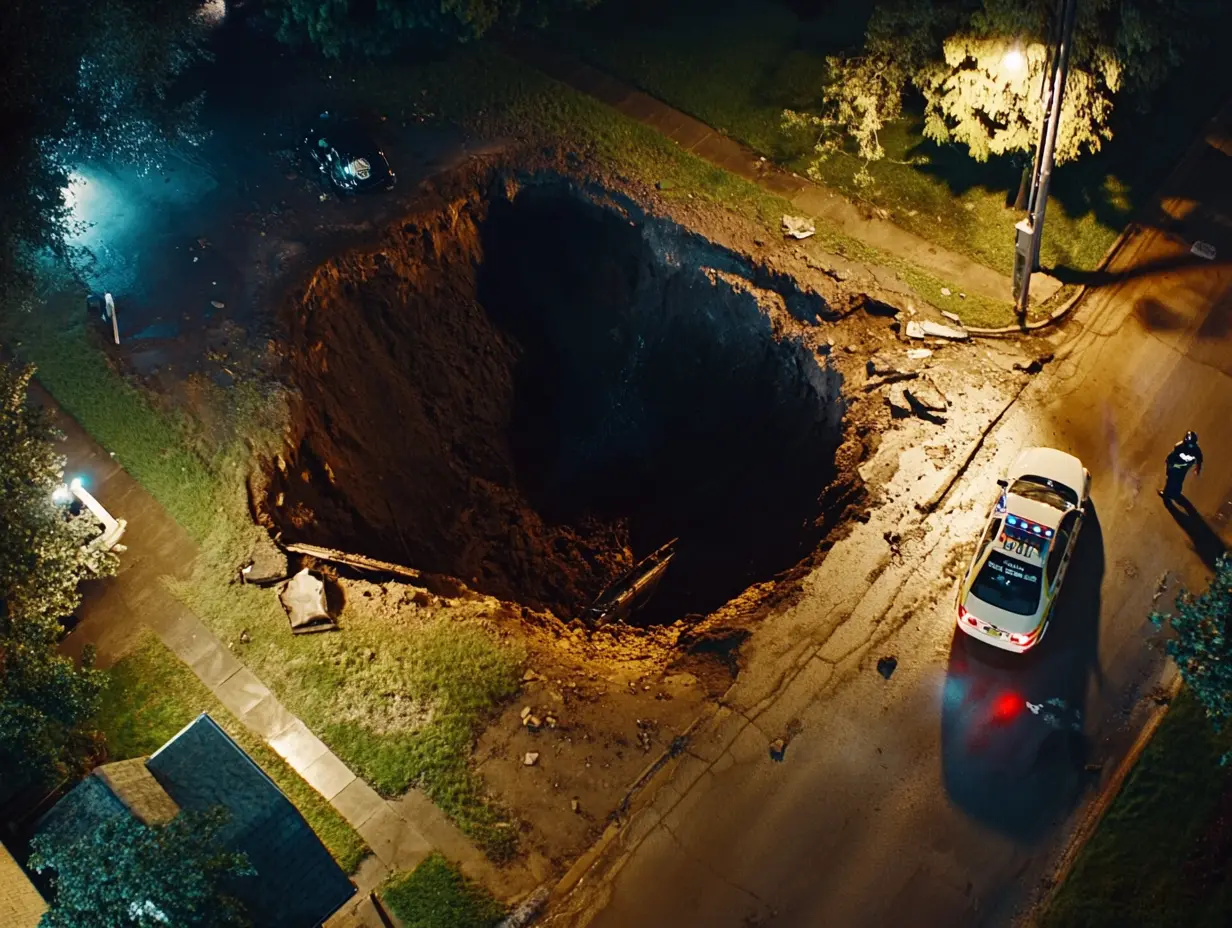The first sound was a groan, low and heavy, like the earth itself was straining. Daniel sat bolt upright in bed as the floor trembled beneath him. Then came the roar—the land outside splitting apart. By the time he reached the window, part of his yard had disappeared into darkness.
Claire screamed from the hallway, the children crying in confusion. Daniel rushed outside barefoot, rain still dripping from the night’s storm. Where the garden once stretched, a massive crater now yawned, soil tumbling inward like sand through an hourglass. The sinkhole looked bottomless, its edges raw, unstable, and unsettlingly fresh.
Neighbors gathered quickly, phones flashing, voices colliding in panic. Police and emergency vehicles arrived, their sirens slicing through the night. As officers pushed people back, Daniel crouched at the rim, instincts kicking in. He wasn’t just a homeowner—he was a geologist. And what he saw didn’t look natural at all.
Daniel’s mornings always began the same. He brewed coffee while Claire made pancakes, the boys bouncing at the table. Ethan, nine, rattled off soccer stats, while Leo, seven, tried to sneak chocolate chips into his plate. Their laughter filled the kitchen, warm and ordinary, the kind of noise that anchored Daniel.

After breakfast, the boys scattered into the yard. Claire reminded them about homework, but her voice carried no real urgency. Daniel leaned against the doorframe, watching them kick a ball across the grass. The house felt lived in, layered with small imperfections—crayon marks on walls, muddy boots by the back door.
Daniel had always felt lucky. As a geologist, he spent long hours studying maps, charts, and core samples, yet here he had what he called his “field site of joy.” A family. A home. Soil that should have been steady beneath his feet. He never imagined otherwise.
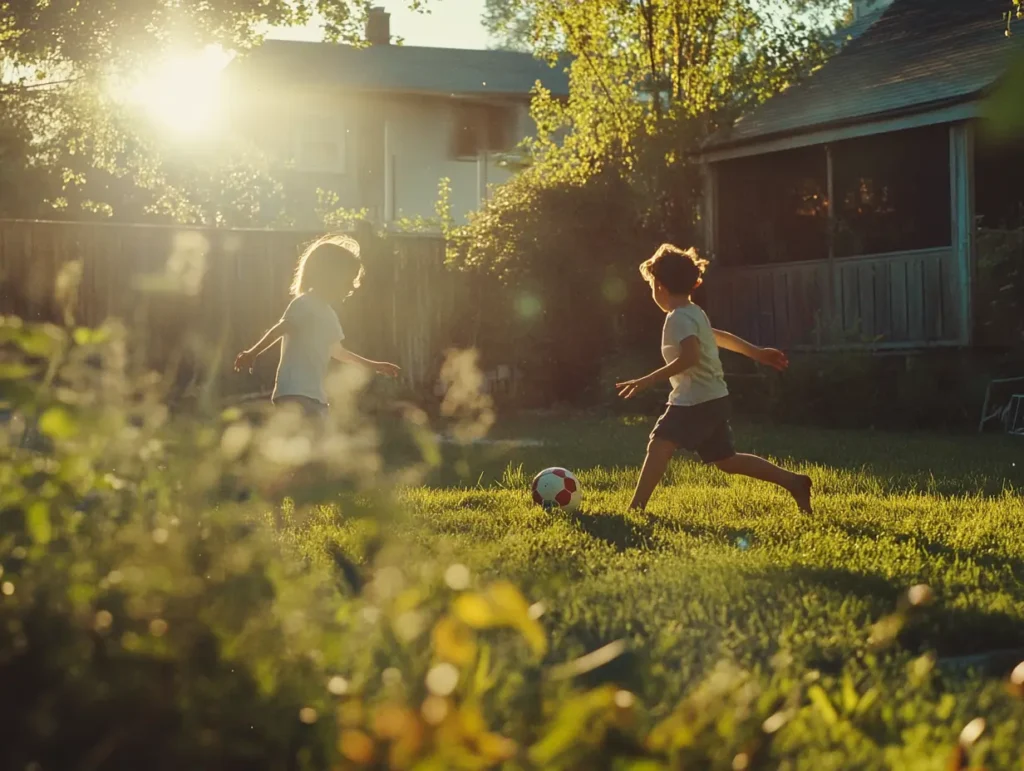
The day passed gently. Claire tidied the kitchen, humming softly, while Daniel answered a few emails for work. The boys ran in and out, their sneakers tracking dirt across the floor. It was noisy, messy, beautiful. Daniel thought, fleetingly, that days like this were proof of a life well lived.
By early afternoon, the house quieted. The boys sprawled on the living room rug with comic books. Claire sat with a mug of tea, scrolling her phone. Daniel yawned, stretching his back. “I think I’ll grab a quick nap,” he said, patting her shoulder. She smiled, eyes still on the screen.
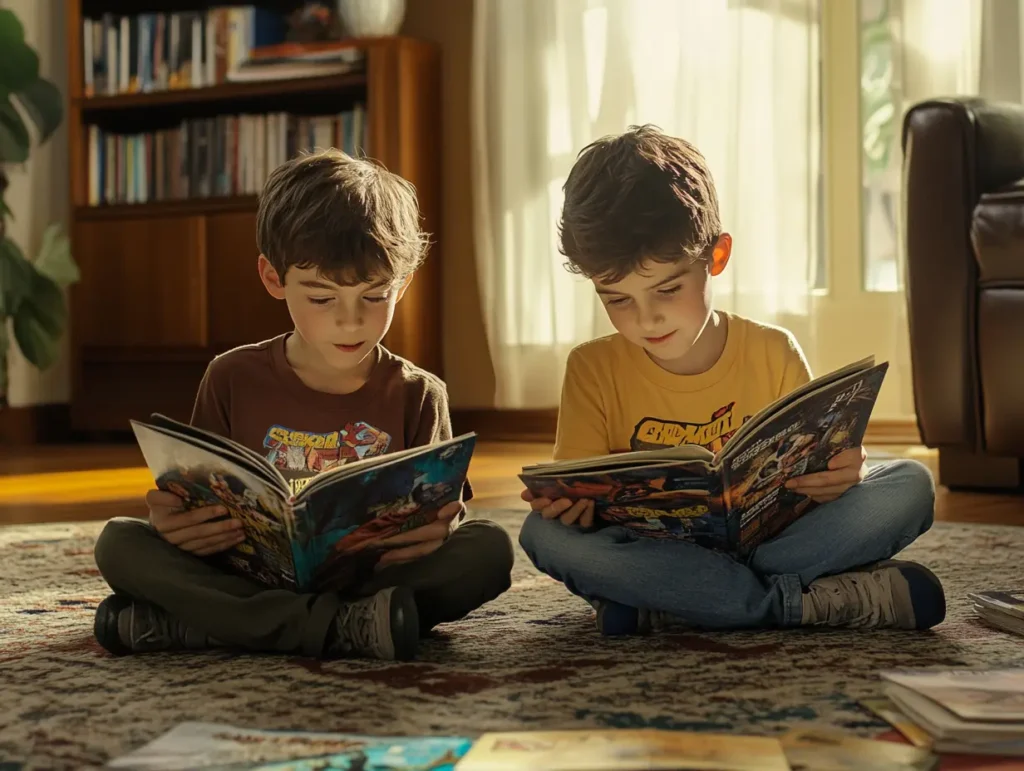
He climbed the stairs, the house creaking in familiar ways. In the bedroom, he drew the blinds halfway, letting muted light filter across the quilt. He lay down, exhaling deeply, the hum of ordinary life settling around him. For once, he felt no pull of work, only contentment.
Then the ground shuddered. A deep, rolling groan rumbled through the house. Daniel sat up, heart hammering, as picture frames rattled on the dresser. From downstairs came the crash of something falling, followed by Claire’s startled cry. The sound grew louder, a roar that seemed to tear through the very earth.
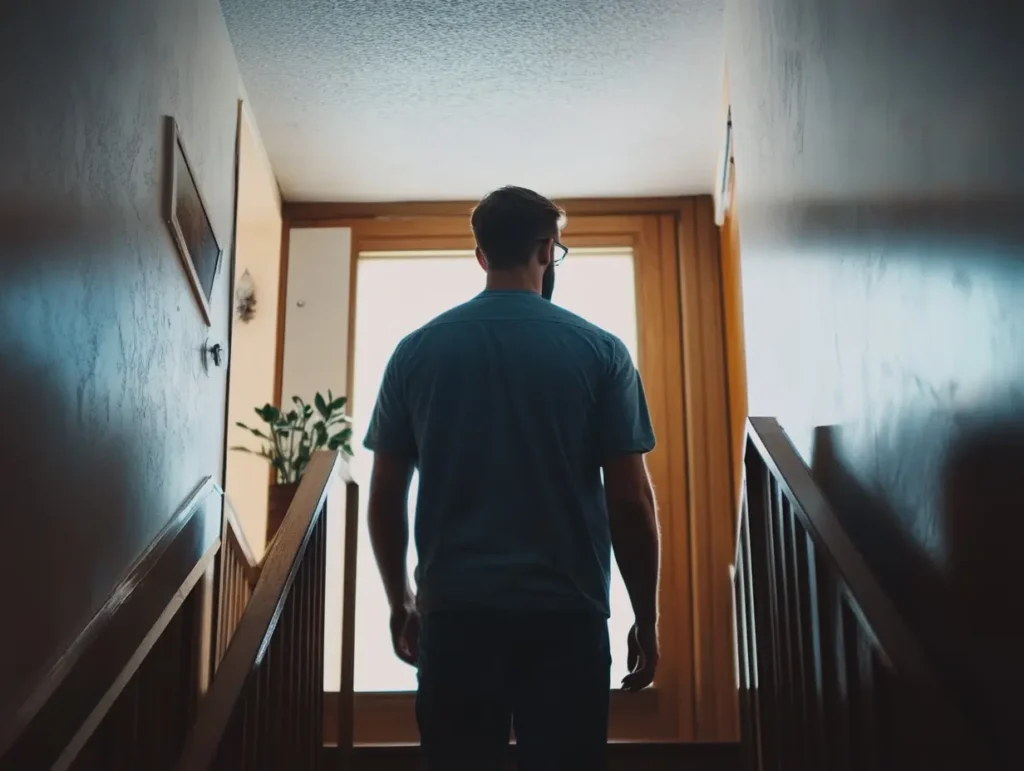
Daniel sprinted to the window just as the yard collapsed. Soil caved inward, fence posts snapping like matchsticks, the ground spiraling downward into a widening maw. The soccer ball the boys had abandoned earlier rolled once, twice, then vanished into the darkness. The earth had opened its throat.
Claire’s scream pierced the air, the boys shouting in terror. Daniel bolted down the stairs, his body moving faster than thought. By the time he burst outside, half their yard had vanished into a chasm. The sinkhole gaped impossibly wide, soil still crumbling in waves, as though the land itself was swallowing.
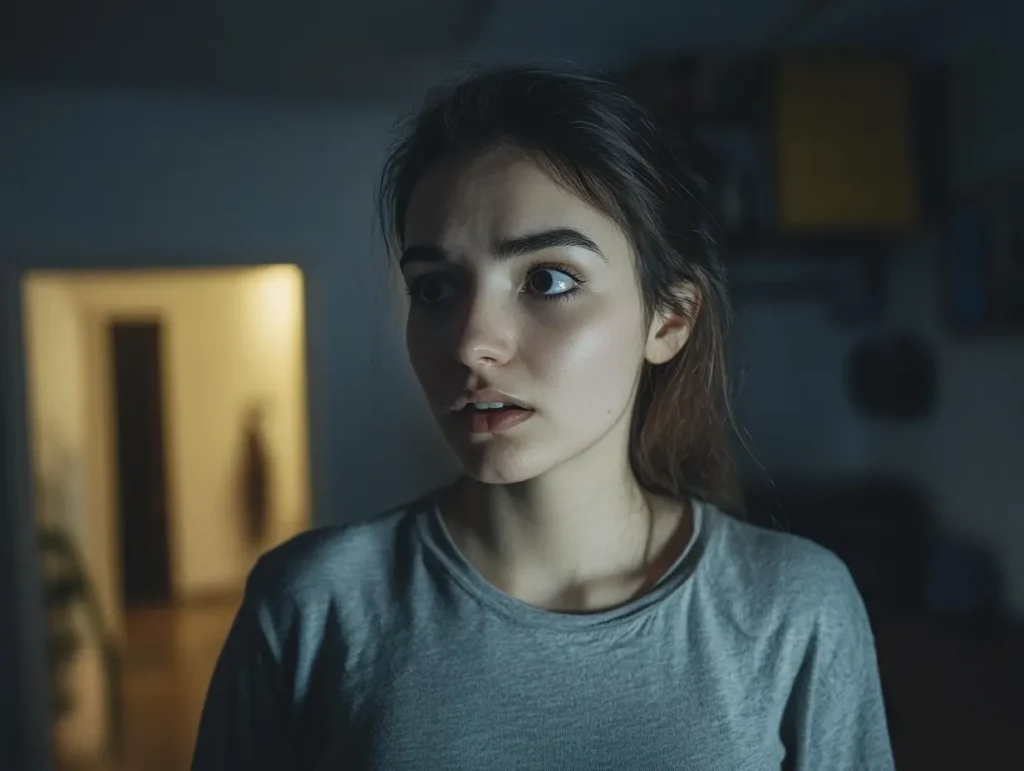
Neighbors began spilling onto porches, voices rising in confusion. Somewhere down the street, a dog barked frantically. Claire clutched the boys to her, her eyes wide with fear. Daniel stepped closer to the rim despite the danger, his geologist’s instinct overriding panic. What he saw there made his stomach twist.
For a moment, time seemed to stretch. The roar faded, leaving only the hiss of shifting soil and the boys’ ragged sobs. Claire held them tighter, whispering reassurances she didn’t believe. Daniel forced himself to step back from the rim. The sinkhole looked bottomless, a wound still widening beneath their lives.
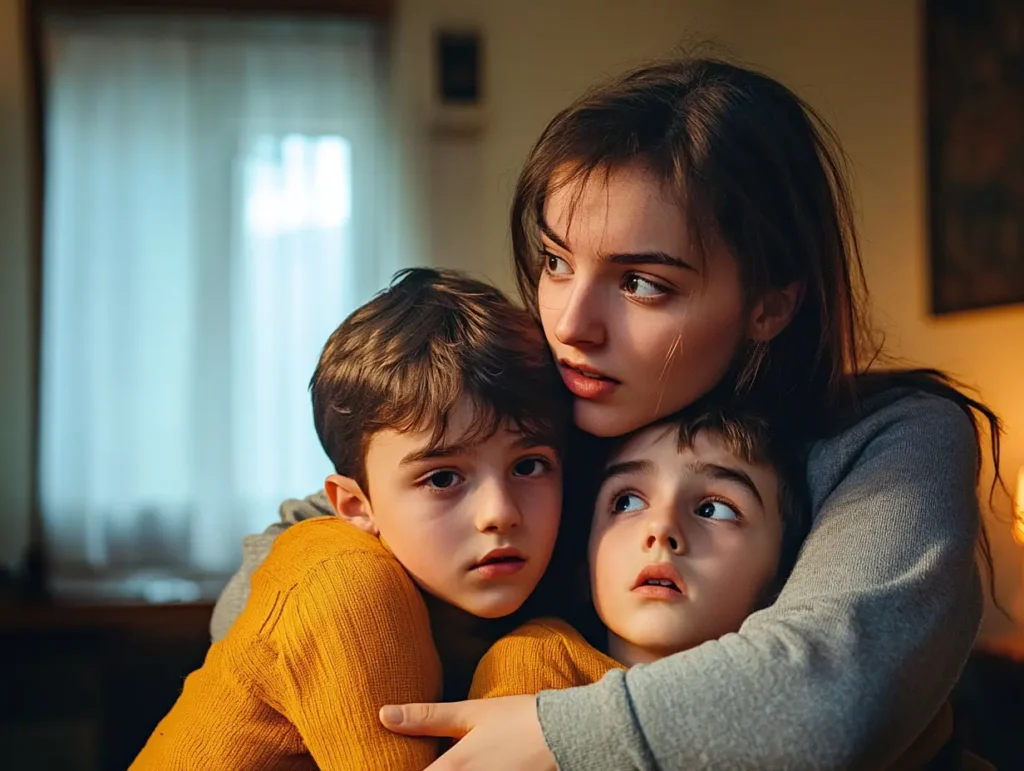
The family huddled together on the porch, too shaken to speak. Across the street, neighbors called out—questions, prayers, panicked guesses. Someone finally dialed emergency services. Daniel stared at his sons, dust streaking their cheeks, and realized with dread that he didn’t know how to explain this. Not as a father. Not even as a scientist.
When the sirens came, they cut through the neighborhood like sharp blades. Police, firefighters, and municipal workers poured onto the property, stringing tape, shouting orders. Floodlights rose, their harsh glow throwing jagged shadows across the crater. The family was pushed back, folded into the growing crowd of onlookers.
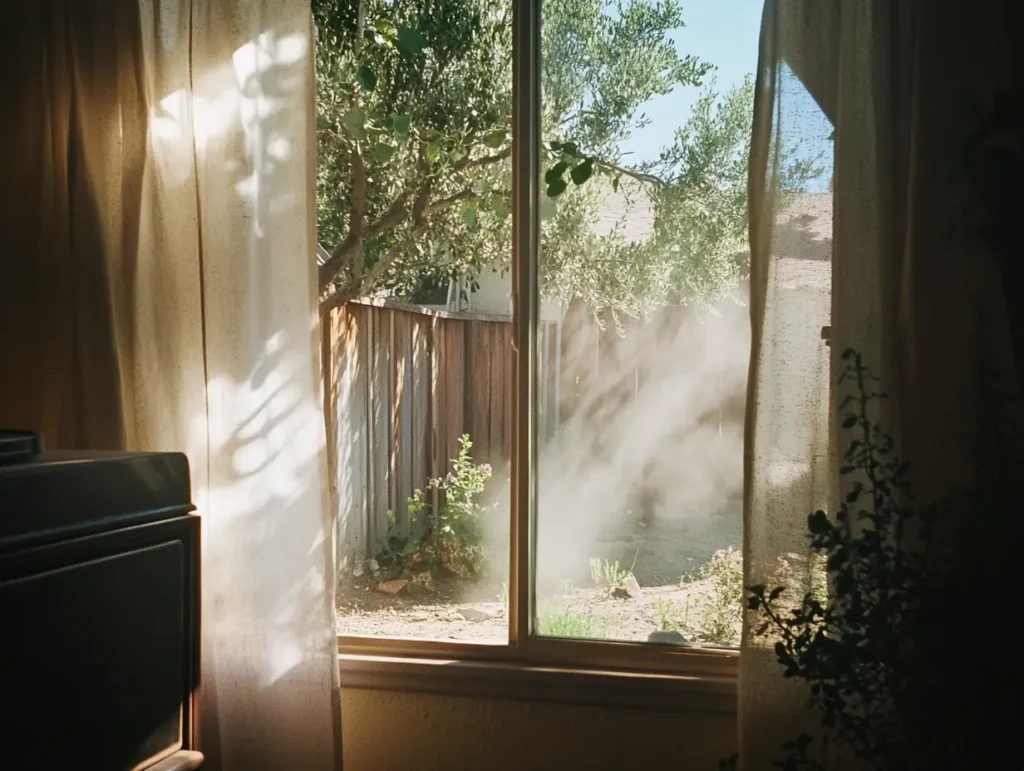
Daniel couldn’t help himself. He walked closer to the officers clustered near the rim, their faces drawn as they studied the jagged edges. “Any idea what caused it?” he asked, his voice steadier than he felt. One of them shook his head. “Could be natural subsidence. We’ll know more when we send the camera down.”
Daniel hesitated, then said, “I’m a geologist. I’ve studied sinkholes, landslides, collapse zones. This… doesn’t look right to me.” The officer looked up, surprised, studying him for a long moment. Around them, the buzz of radios and shouts filled the air, but Daniel stood firm, unwilling to step back into silence.
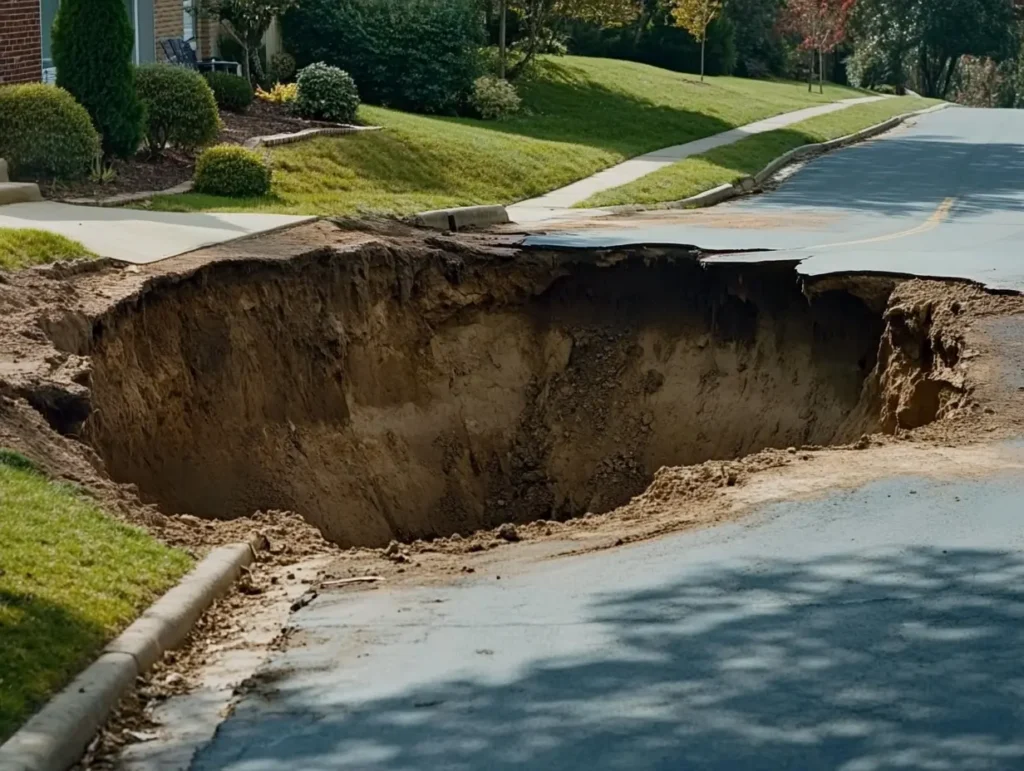
“What doesn’t look right?” the officer finally asked. Daniel pointed toward the walls. “The soil’s profile is too disturbed. Natural collapses leave patterns, compacted layers. This looks—different. Like it was interfered with.” He swallowed. “It doesn’t add up.” His words hung in the air, unsettling even to himself.
The officer rubbed the back of his neck, frowning. “We’ve got city engineers coming, but…” He looked at Daniel again, weighing something. “If you’re willing, maybe you can help us make sense of what we’re seeing.” For a moment, Daniel felt the ground tilt under him—not from collapse, but from responsibility.
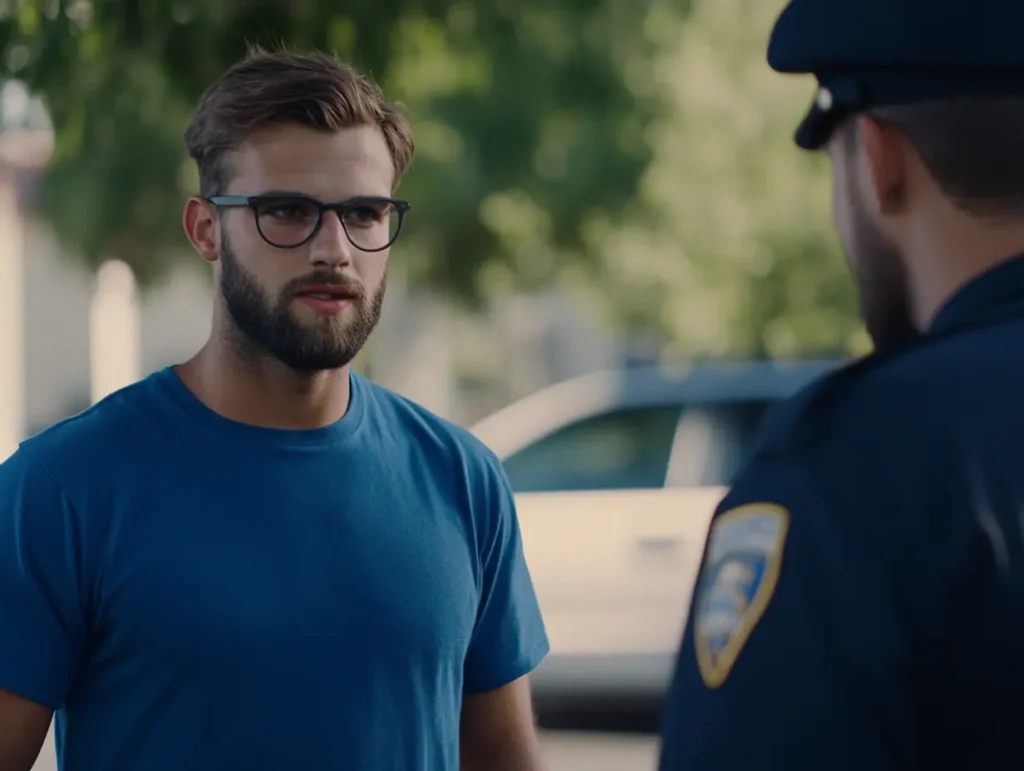
Cameras were lowered into the abyss, their feeds projected onto a small screen. Daniel stood shoulder-to-shoulder with officials, heart pounding. The first images showed raw soil walls, layers exposed like a textbook cross-section. Then, deeper, the camera swung right—catching a flat, unnatural edge. Straight. Purposeful. Like something built.
The engineer muttered, “That can’t be right.” A police officer leaned closer. “Old mine shaft?” Daniel shook his head slowly. The soil was too loose, too fresh. He’d seen collapsed mines before. This wasn’t one of them. His stomach tightened. Whoever made that line hadn’t done it decades ago.
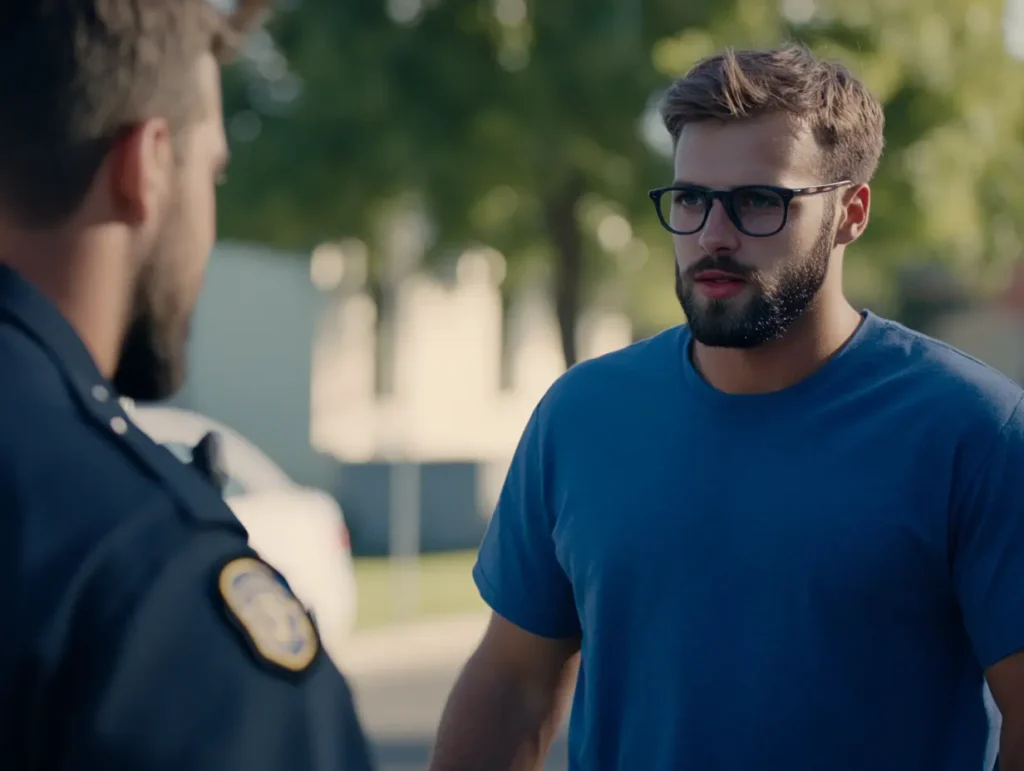
Claire approached, her voice trembling. “Daniel, please get back inside.” But he couldn’t tear himself away. The screen flickered again, the camera dangling deeper into shadow. And there it was: the outline of a tunnel, braced with rough timber, pointing away from the house into darkness.
The crowd murmured uneasily, whispers rippling like static. The officer beside Daniel exhaled sharply. “That’s not supposed to be there,” he muttered. Daniel’s jaw clenched. He knew he was right—this was no natural sinkhole. This was something carved, something hidden. And now, it was open for everyone to see.
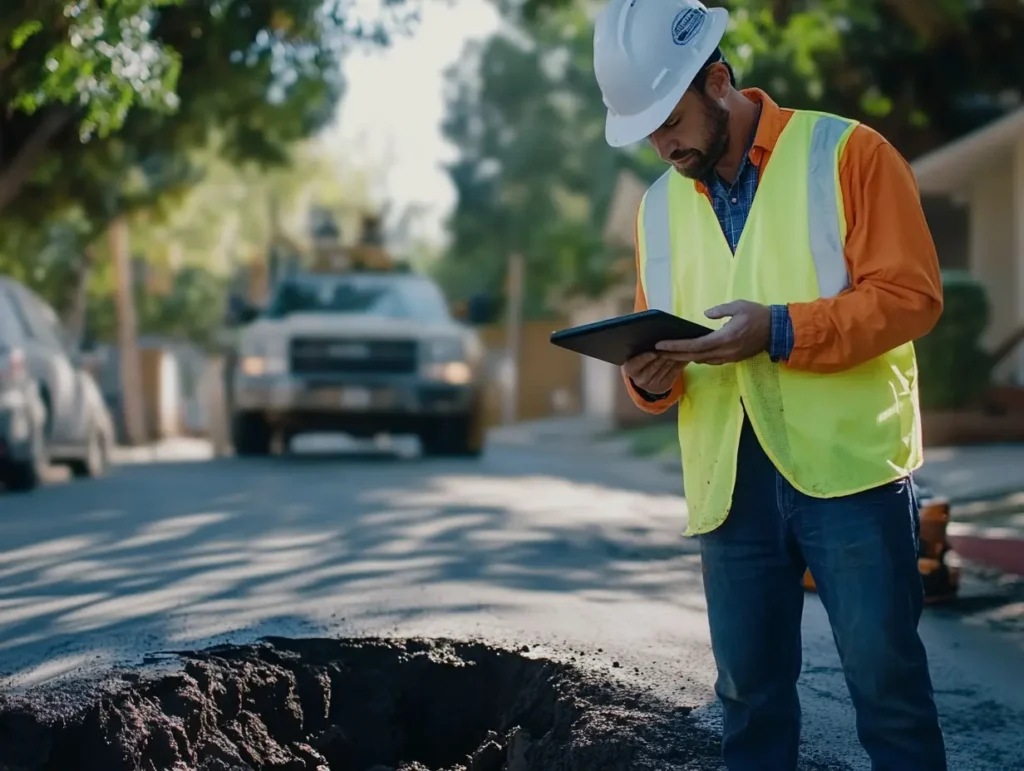
For a long moment after the collapse, only the hiss of settling soil and the boys’ cries filled the air. Claire clutched them tightly on the porch, whispering that everything would be okay. Daniel stood at the edge of the crater, heart hammering. All he could see was chaos—jagged earth, broken fencing, and piles of debris choking the hole.
By the time emergency vehicles arrived, the property looked like a disaster zone. Floodlights lit the rim, radios buzzed, officers pushed back onlookers. Heavy machinery rolled in, engines groaning. Daniel tried to focus on his family, but his eyes kept sliding back to the sinkhole’s rim. Something about the collapse didn’t sit right.
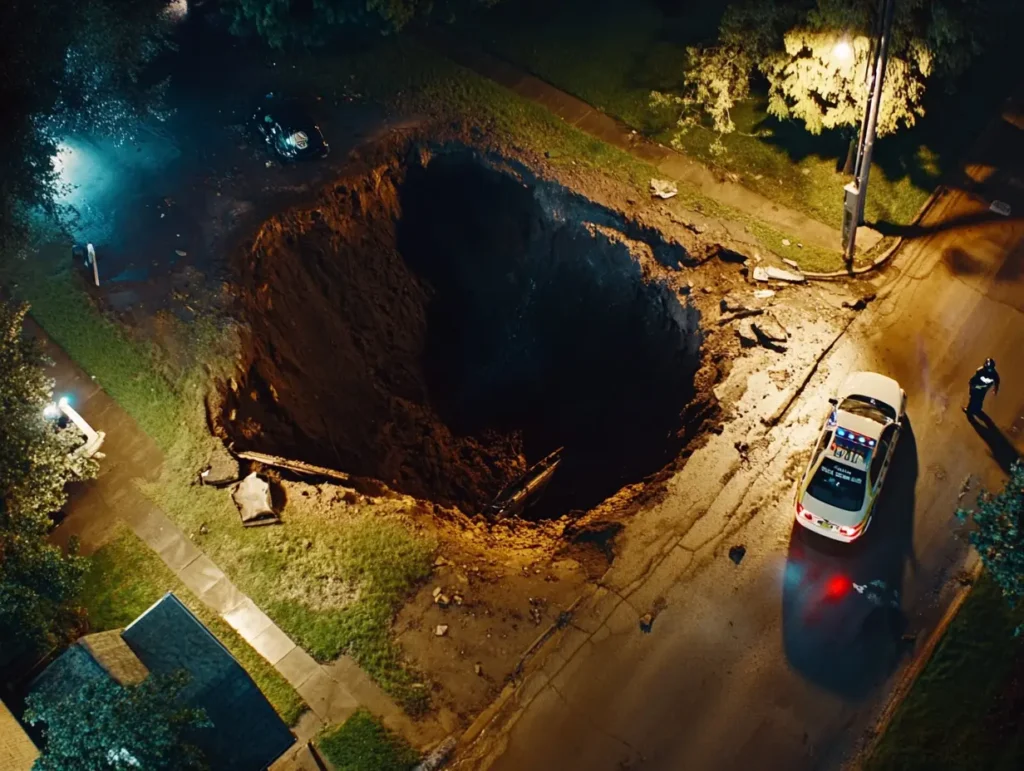
The feed from earlier was nearly useless. Soil and splintered roots smeared across the lens, blocking any clear view of the bottom. “Too much debris,” one of the engineers muttered, shutting the monitor off with a sigh. “We’ll have to clear it first.” Crews began hauling out broken boards and clumps of earth, sweat gleaming under the harsh lights.
Daniel drifted closer, curiosity outweighing fear. “Any idea what caused it?” he asked one of the officers. The man shook his head. “Not yet. Looks messy.” Daniel hesitated before speaking. “I’m a geologist. I’ve studied collapses before. This… doesn’t look like a typical sinkhole.” The officer frowned but didn’t dismiss him.
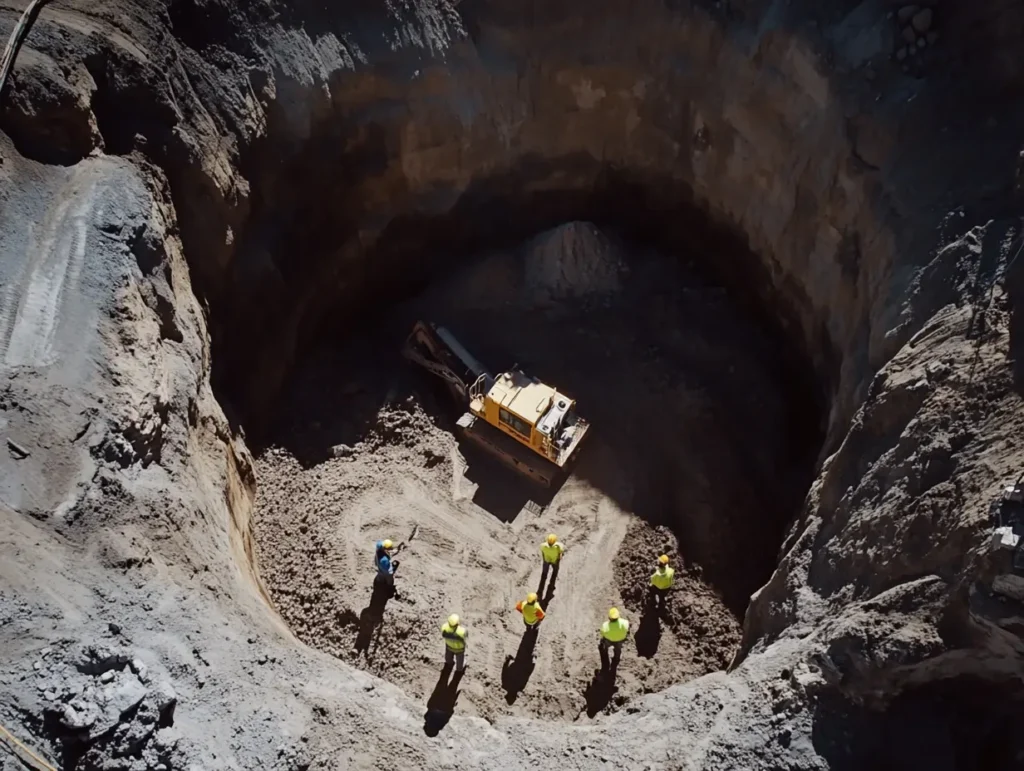
Hour by hour, the debris came up. As soil was scooped away, a shape began to emerge—an edge too straight, a hollow too deliberate. When the floodlight shifted, Daniel’s stomach lurched. It wasn’t just raw earth. It was the outline of something that looked like a tunnel.
The city engineer swore under her breath. “That shouldn’t be there.” A colleague unrolled laminated planning maps, tracing the area with a finger. “No records of anything below this property,” he said. “No utilities, no mines, no historical shafts.” The maps showed clean, solid ground. The images in front of them said otherwise.
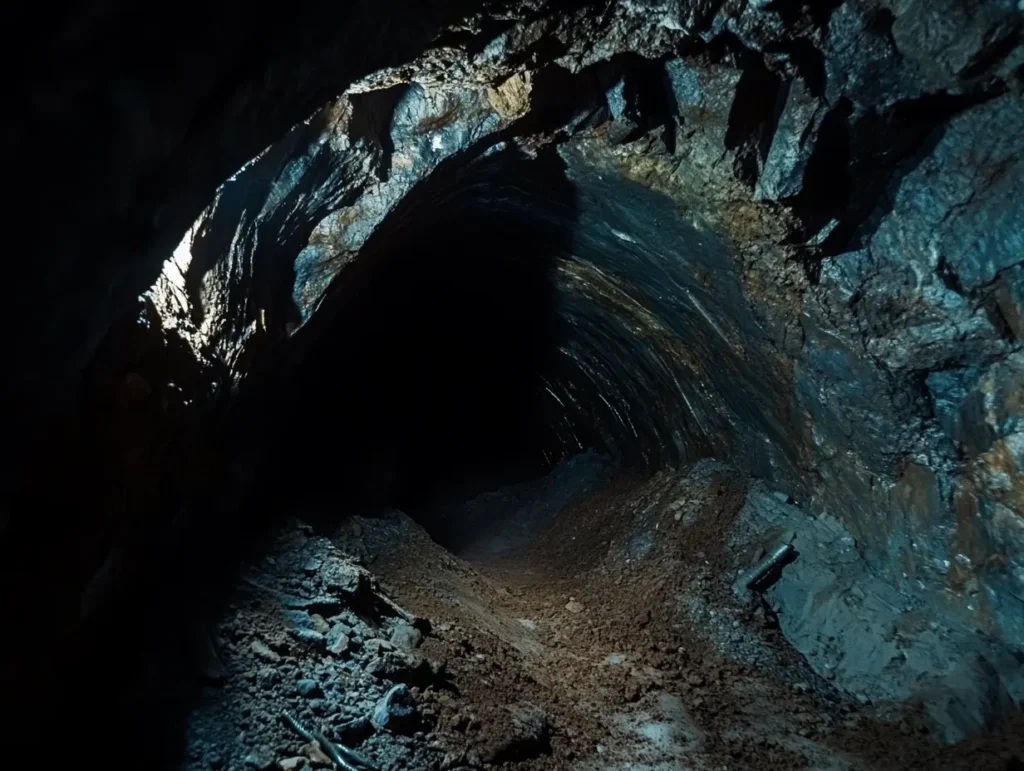
Officials gathered around the feed, arguing in low voices. Old bootlegging tunnels? Forgotten storm drains? None of it made sense. The soil was too loose, the timber too fresh. Daniel leaned closer, pulse thudding. This wasn’t just nature collapsing on itself. Someone had carved out space down there—and recently.
Claire touched his shoulder nervously. “Daniel, please, come back.” But he couldn’t. The hole had taken more than their yard; it had stolen certainty itself. Whatever was beneath their house wasn’t natural. And as the debris cleared, it was beginning to look more and more like a secret passage.

The clearing work continued late into the night. Each scoop of soil revealed more of the tunnel’s shape, until the cameras finally caught an opening: a narrow passage reinforced with crude timber. It wasn’t old—the beams looked freshly cut, soil still loose around them. Daniel’s pulse quickened.
The engineers huddled over their maps again, voices clipped with disbelief. “No record of any tunnel here. Not on historical surveys, not on utility grids.” Another shook his head. “This isn’t an old structure. This was dug.” The word dug carried a weight, like an accusation thrown at the earth itself.
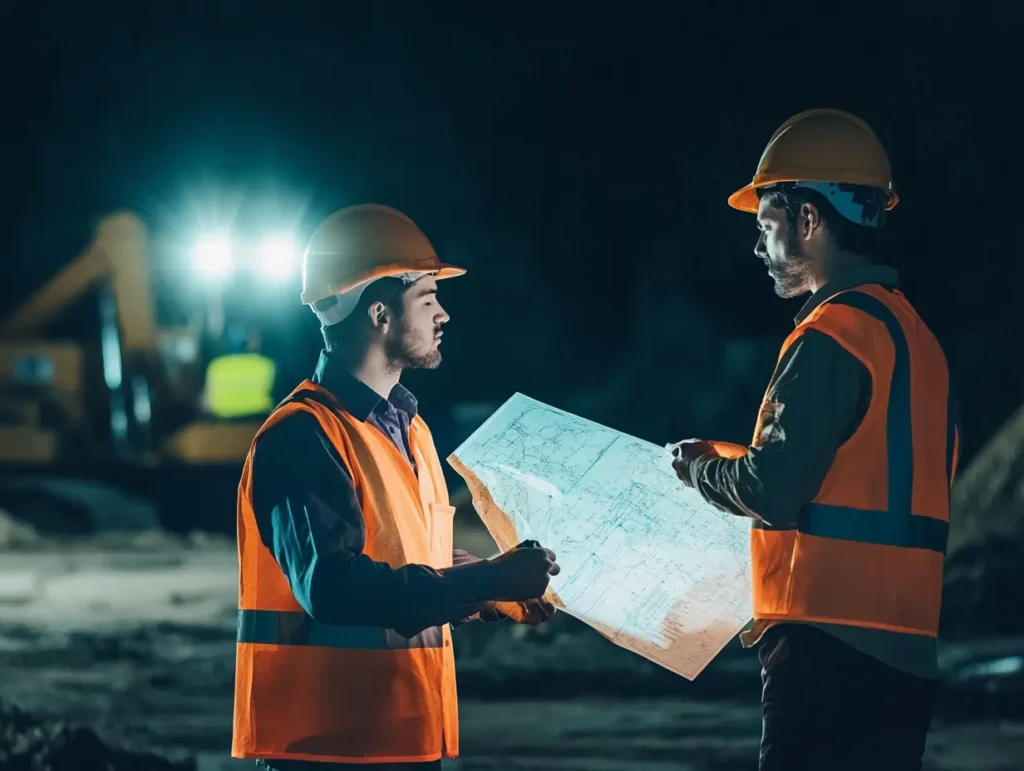
Daniel stepped closer. “If you want my opinion,” he said carefully, “this soil was disturbed recently. Weeks, maybe months—not decades. A natural sinkhole doesn’t reveal bracing like that.” The lead engineer glanced at him, skepticism giving way to curiosity. “You said you’re a geologist, right? You willing to consult?”
Reluctantly, Daniel nodded. He felt Claire’s eyes on him from the porch, but he couldn’t back away now. This was his land, his home, and now his expertise was the only anchor against chaos. He crouched near the rim, tracing the disturbed layers with a gloved hand. “This wasn’t nature. This was human.”

As more debris came up, the tunnel stretched further into darkness. Workers lowered a camera, its feed shaky but clear enough to show the crude timber bracing. Daniel leaned closer to the monitor, his stomach tightening. “That’s no natural void,” he said. “Those supports—someone put them there. This was dug.”
Police officers began speculating. “Smugglers?” one suggested. “Old Prohibition tunnels?” another guessed. Daniel shook his head. “The soil compaction is too loose. It hasn’t sat undisturbed for a century. Whoever did this started recently—and they knew what they were doing.” He didn’t say what else he was thinking: it was still active.
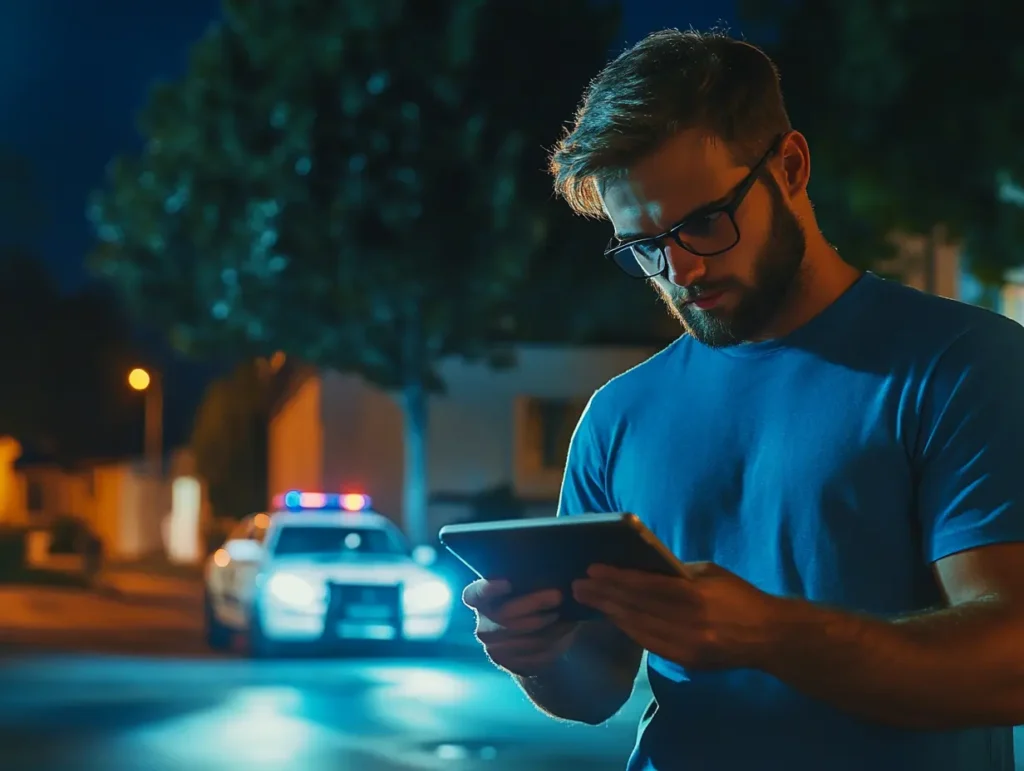
One officer lit a cigarette, nerves making his hands jitter. “So what, someone’s been digging under this guy’s house?” Daniel stayed quiet, but the thought made his chest tighten. It wasn’t just his house—it was his children’s backyard, their soccer field, their garden. Whatever was down there, it had come far too close.
Floodlights tilted again, sending shadows crawling across the tunnel mouth. A worker lowered the camera deeper. The feed flickered, catching glimpses of discarded tools, scraps of fabric, and something that looked like a half-eaten ration packet. Daniel leaned closer, heart hammering. This wasn’t just a tunnel. It was in use.
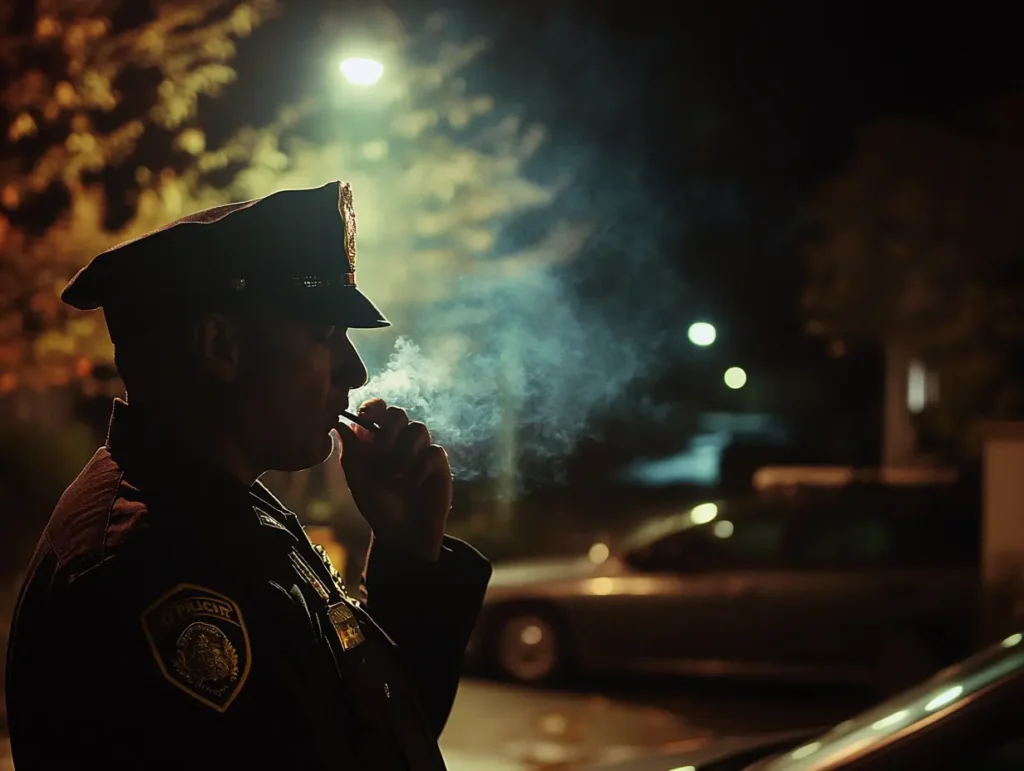
The officer beside him muttered, “This isn’t supposed to exist.” His voice cracked, as though the ground beneath his certainty had given way too. Daniel knew one thing for sure: the sinkhole hadn’t just revealed a hole in the earth—it had uncovered something someone desperately wanted hidden.
By the time the crews packed up for the night, Daniel felt the weight of what was coming. The tunnel was there, undeniable. Tomorrow they would go deeper. And deep down, he already feared the answer to the question no one wanted to say aloud: where did it lead?
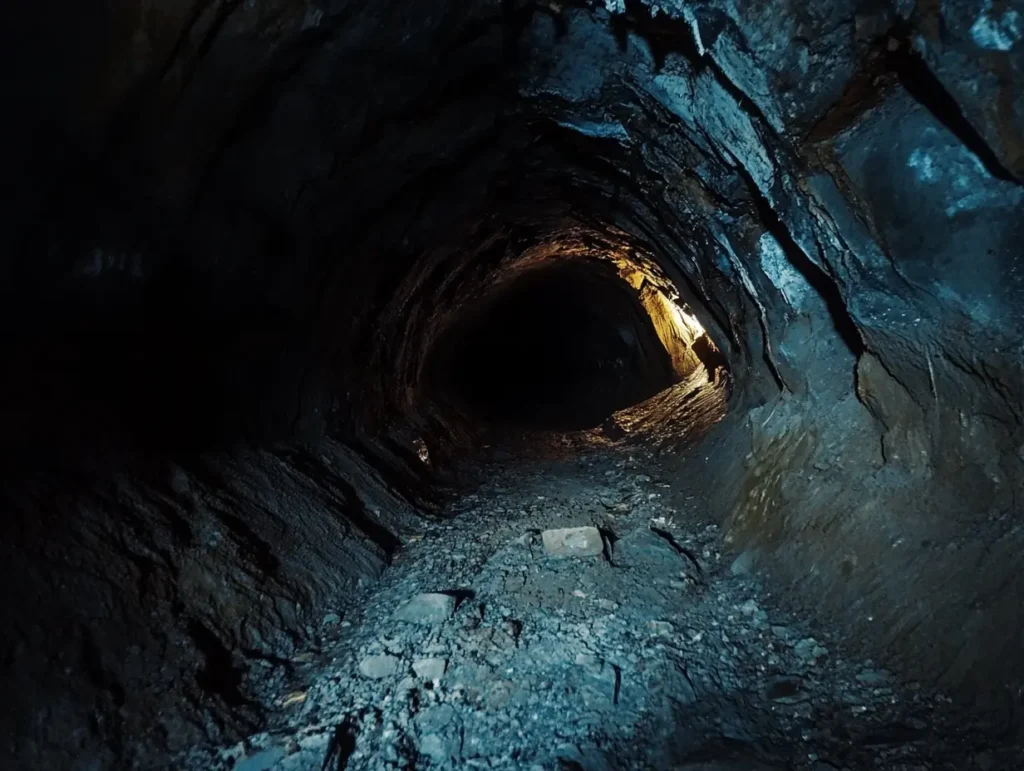
Morning brought no peace. The sinkhole loomed larger in daylight, its edges roped off, machinery parked like sentinels. Daniel sipped bitter coffee on the porch, watching officials return in clusters. Claire hovered beside him, her voice low. “You don’t have to get involved.” But he already knew he would.
Police officers and engineers conferred, then waved him over. The lead investigator gestured toward the screens. “You were right about the soil. We could use your eye when we go down there. Are you willing to come along?” Daniel hesitated, but the answer came quicker than he’d liked. “Yes.” He couldn’t turn away now.
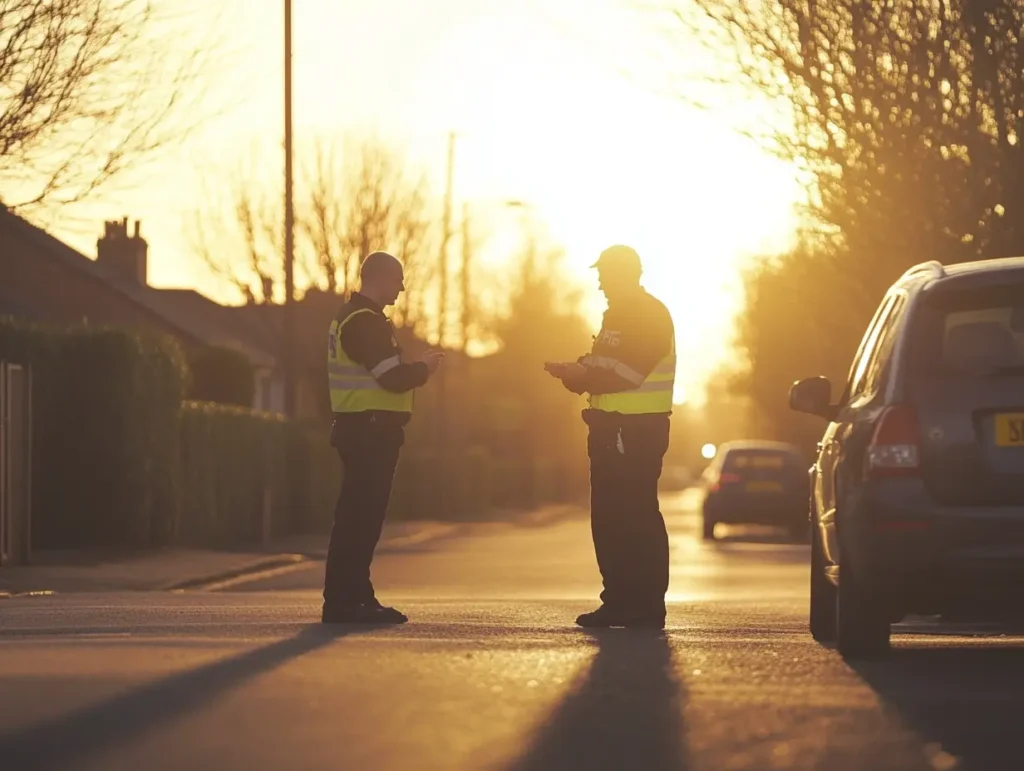
Harnesses were fitted, helmets checked, radios crackling. Daniel descended with two officers, the air growing cooler, the smell of damp soil filling his nose. Floodlights swung above, catching the rough timber supports. The tunnel’s walls pressed close, carved jaggedly by hand. It was claustrophobic, a vein cut into the earth.
As they moved, Daniel noticed details that chilled him: tool marks fresh on the walls, piles of loose soil not yet compacted, and crude braces wedged at awkward angles. This wasn’t decades old. This was recent, alive with the evidence of work still underway. His heart beat faster with every step.
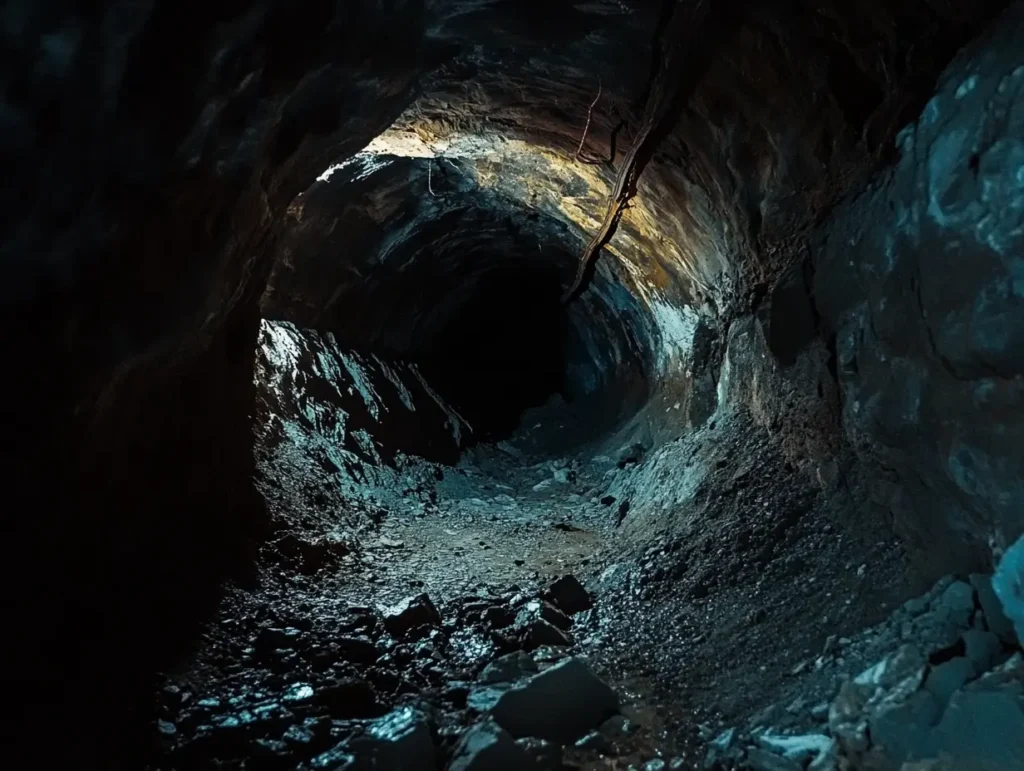
Fifty yards in, one officer cursed softly. A heap of discarded supplies littered the ground—plastic water bottles, wrappers, even the stub of a candle burned low. Daniel crouched, running his hand over the wax. It hadn’t collected dust, hadn’t even melted fully. “Whoever was here,” he whispered, “was here recently.”
The tunnel pressed on, stretching into darkness. A faint draft of air carried the smell of rust and something else—sweat, maybe. Daniel’s palms grew slick in his gloves. This wasn’t just an abandoned project. It was a pathway still in use, carved beneath his home, inching closer to some unseen destination.
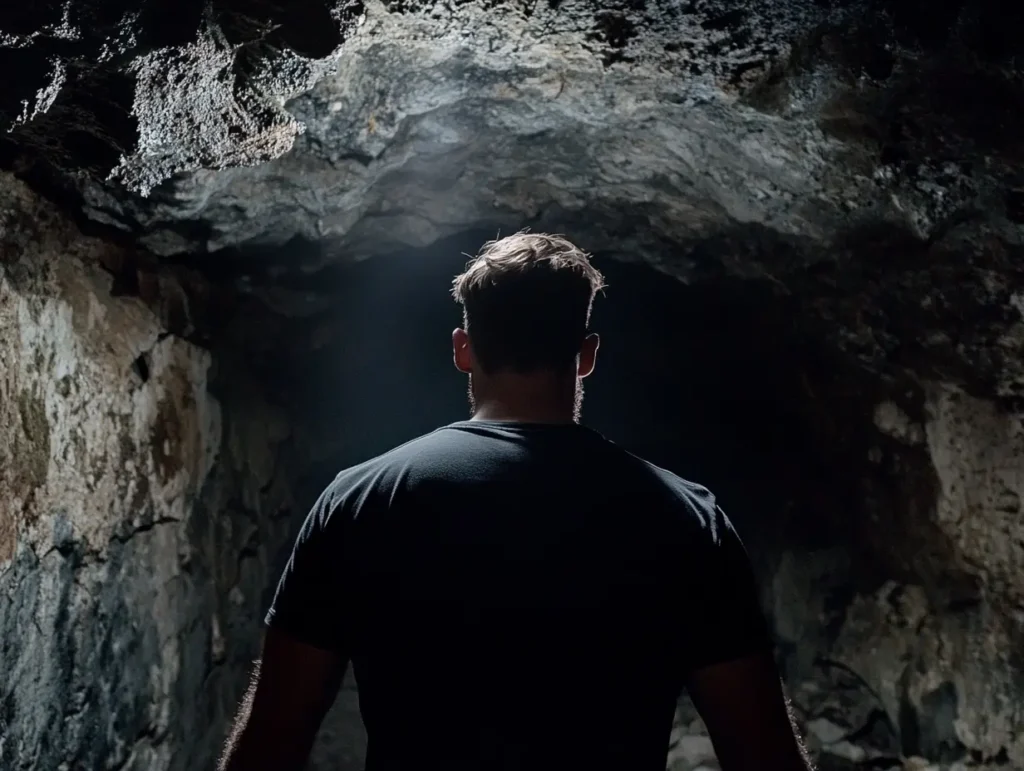
Back at the surface, engineers compared notes, laying rulers across maps. The tunnel’s heading wasn’t random; it cut straight, purposeful, as if someone had planned every angle. Daniel traced the vector with his finger, his brow furrowing. It wasn’t heading toward town, nor to any known infrastructure.
Arguments broke out among the officials. “Smugglers?” one asked. “Bootleg tunnels?” another guessed. Daniel shook his head. “The soil’s too loose. This isn’t something that sat untouched for decades. Whoever dug this, they’re still working it.” His words silenced the group, leaving a hush that felt heavier than the soil itself.

The officer beside him muttered, “This doesn’t make sense.” He stared at the map again, tracing the tunnel’s path. It didn’t cross any documented lines, didn’t match any old utilities. It led… somewhere else. And the fact that no one could say where—that was the most frightening part of all.
The tunnel seemed endless, the beam of Daniel’s headlamp swallowed by darkness ahead. The officers moved slowly, radios crackling faintly. Then, a glow flickered in the distance. Not theirs. A separate light, bobbing toward them. Daniel froze, heart slamming in his chest. Someone was down here.
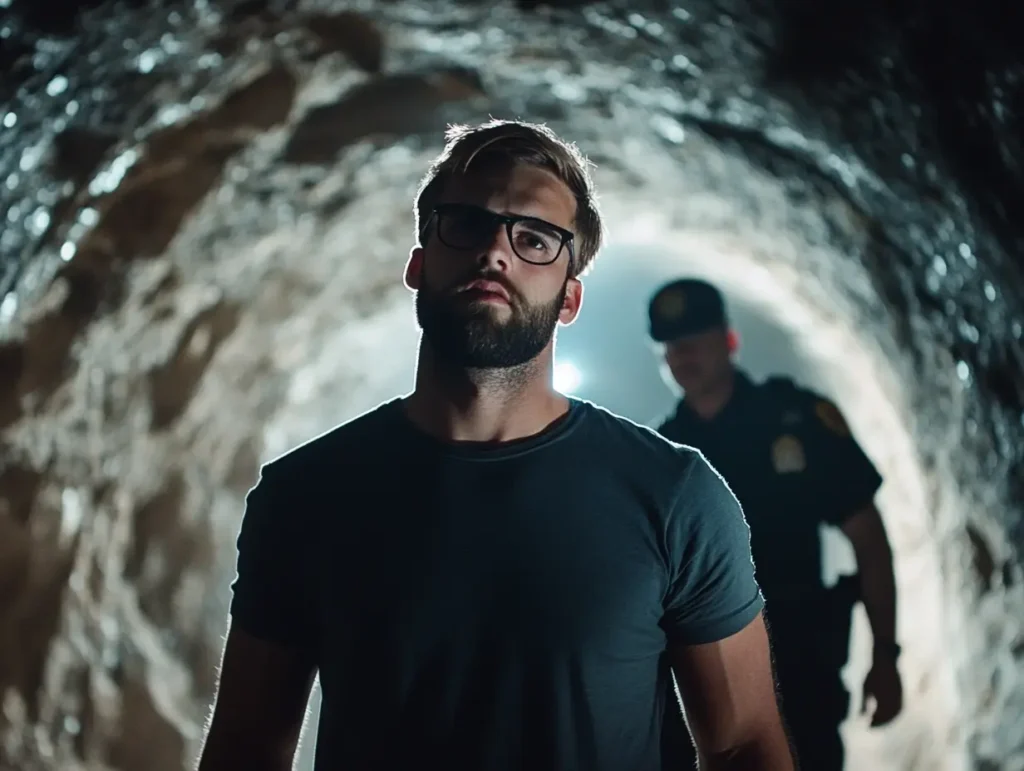
“Hold your ground,” the lead officer whispered, one hand resting on his holster. The glow grew brighter, footsteps scuffing against damp soil. Then a figure emerged—a man in ragged clothes, sweat gleaming on his forehead, eyes narrowing at the sight of strangers in his tunnel.
“Who are you?” the officer barked. The man didn’t answer. His chest heaved, gaze darting between Daniel and the uniforms blocking his path. His silence was louder than any confession. In his hand, he clutched a battered shovel, knuckles white against the handle.
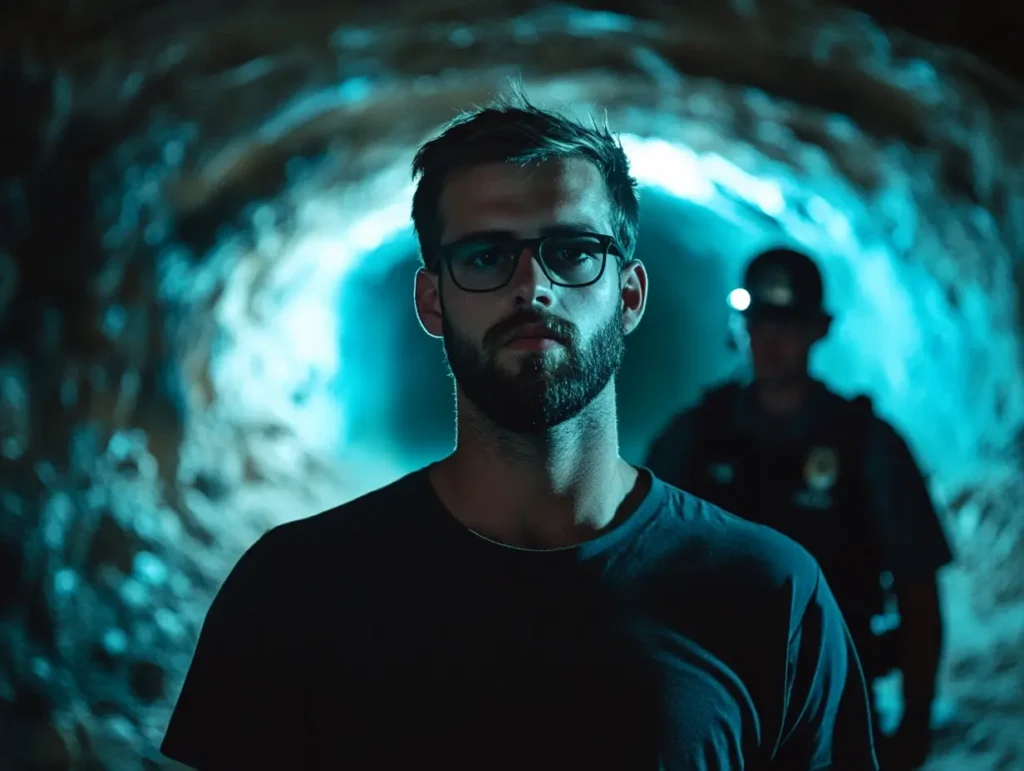
“Drop it. Now.” The officer’s voice hardened. For a heartbeat, the man didn’t move. Then, in a burst, he bolted backward, trying to vanish into the dark. The officer lunged, slamming him against the wall. Soil rained down as the man shouted, struggling, but he was quickly shackled in steel cuffs.
Daniel pressed himself to the wall, breath shallow. He had never seen desperation so raw, so wild. The man muttered curses, refusing to meet anyone’s eyes. But the orange jumpsuit beneath his filthy jacket told the story his silence wouldn’t. He wasn’t just anyone. He was an inmate.
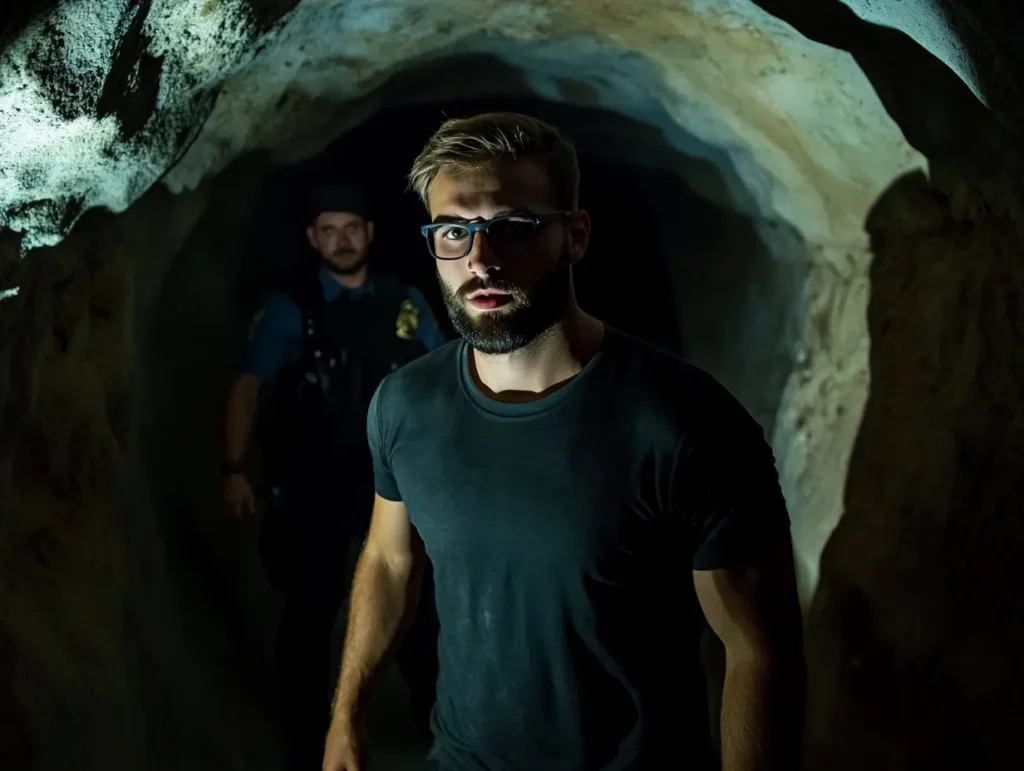
“Where’s this tunnel lead?” the officer demanded, dragging him upright. The prisoner spat at the ground, but the glance he threw down the tunnel gave it away. The direction wasn’t toward town. It was back toward stone walls and razor wire. The tunnel wasn’t random—it was an escape route.
The officers exchanged grim looks. One muttered, “Straight to the penitentiary.” Daniel’s stomach dropped. The sinkhole hadn’t revealed history—it had uncovered an active prison break, carved beneath his own yard.
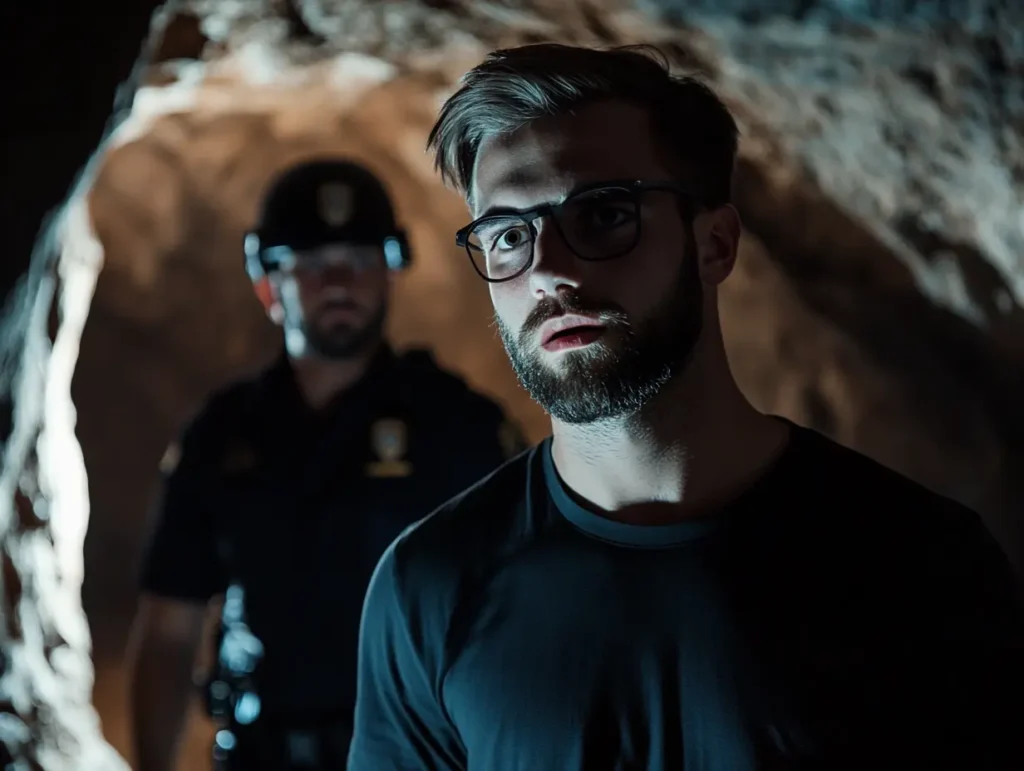
By the time they hauled the prisoner back to the surface, the media had gathered. Cameras flashed wildly as Daniel emerged behind the officers, blinking under the floodlights. Reporters gasped when they saw the man in cuffs, his jumpsuit smeared with dirt, proof of the story no one had expected.
Neighbors craned for a look, voices rising in disbelief. The family pressed closer to Daniel, relief etched across Claire’s face. But Daniel couldn’t shake the thought: if one prisoner had made it this far, how many others were still digging? And how close had they come to freedom?
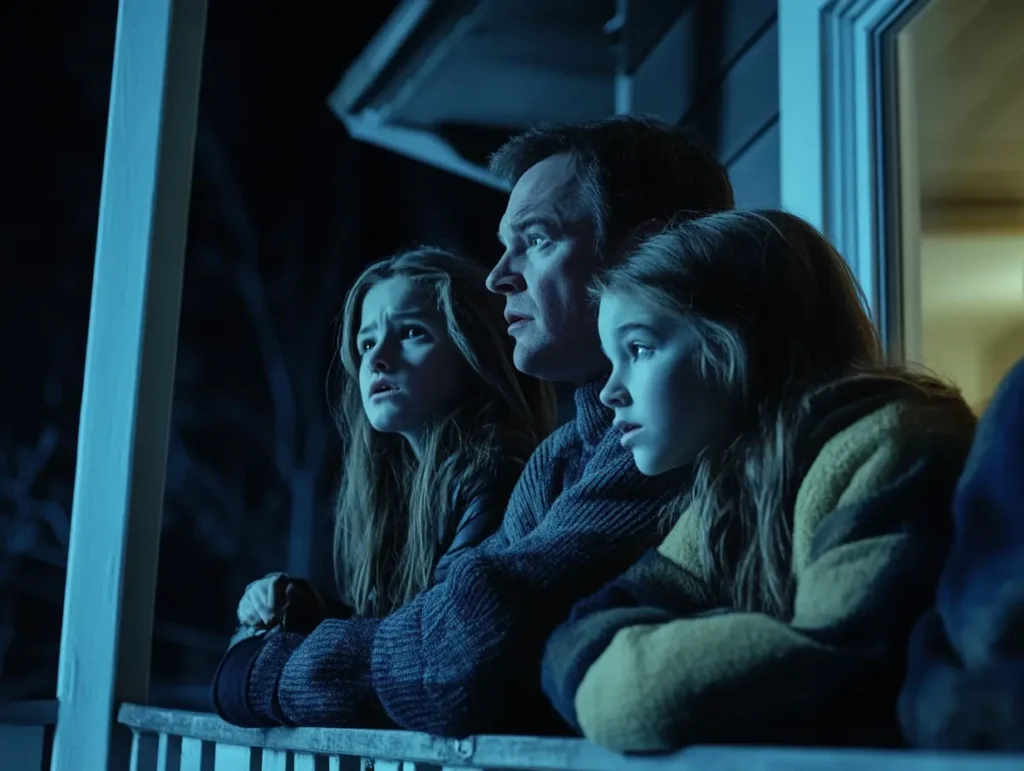
The scene outside their home had transformed overnight. News vans lined the street, reporters shouting questions through microphones as floodlights turned the yard into a stage. Daniel shielded his eyes, wishing the ground would swallow him whole. Claire stood on the porch with the boys, keeping them close, their faces pale.
Police escorted the handcuffed prisoner into a cruiser, cameras flashing with every step. “Is this part of an escape plot?” a reporter shouted. “How many others are there?” another pressed. The officers ignored them, but their tight jaws and clipped movements spoke louder than any official statement could.
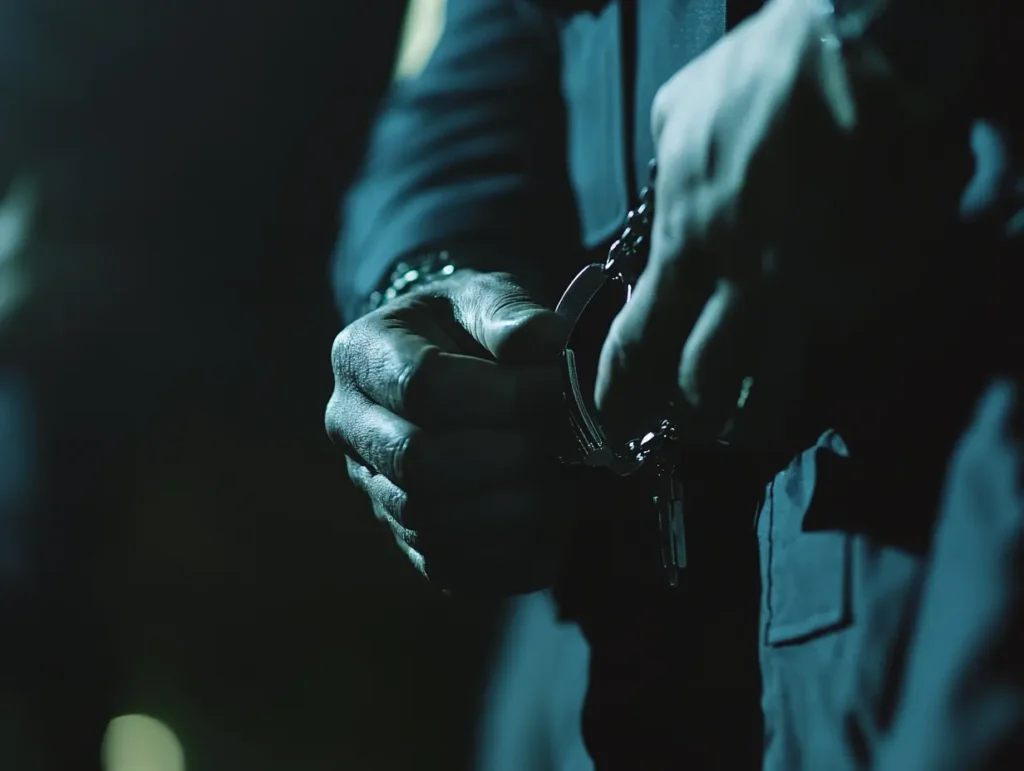
Daniel tried to move past the crowd, but microphones shoved toward him like spears. “Sir, how does it feel knowing inmates were digging under your home?” He didn’t answer. He couldn’t. Every question only tightened the knot in his chest. He wasn’t a story—he was a husband, a father.
Inside, the house felt smaller, suffocating under the weight of fear. Claire cornered him in the kitchen, voice sharp. “This isn’t safe, Daniel. What if more come out of there? What if—” She cut herself short, glancing at the boys in the next room. Her silence said enough.
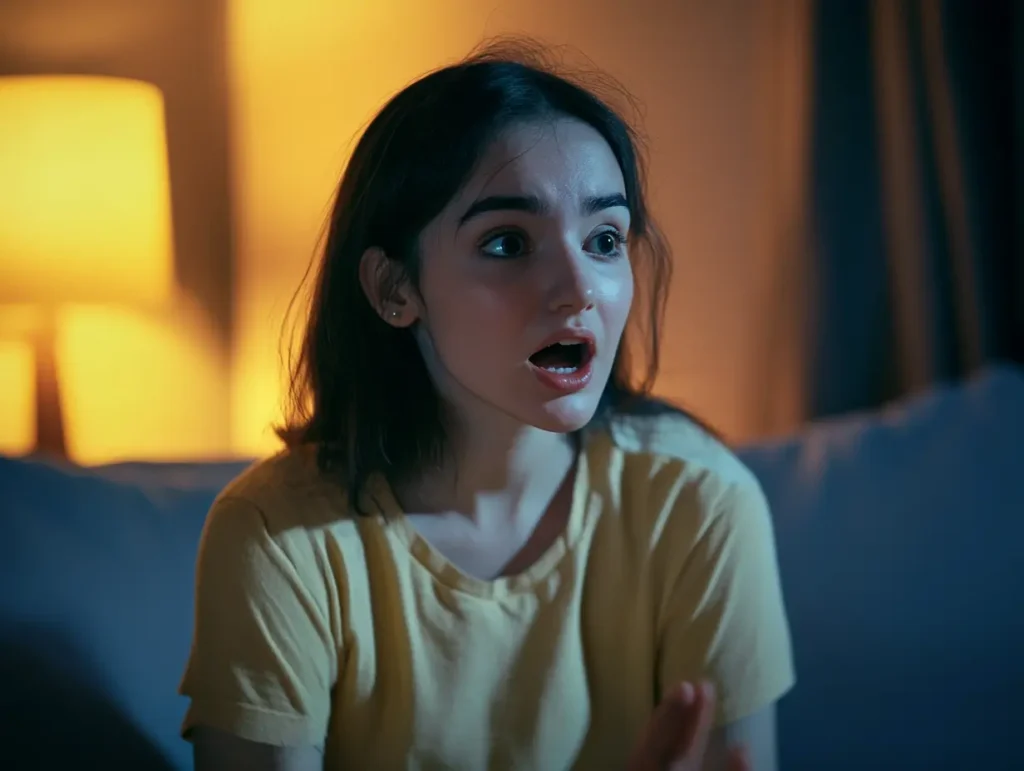
That evening, police officials confirmed what Daniel had already suspected. The tunnel’s trajectory aligned perfectly with the state penitentiary miles away. Escapees had been carving toward freedom for months, maybe years, unseen beneath the earth. The collapse hadn’t been random—it was the byproduct of their desperate digging.
The penitentiary went into immediate lockdown. Sirens blared across town as helicopters circled the area, their spotlights sweeping the forest. Officers in tactical gear marched through Daniel’s yard like soldiers. For the first time in his life, he looked at his property not as home, but as a frontline.
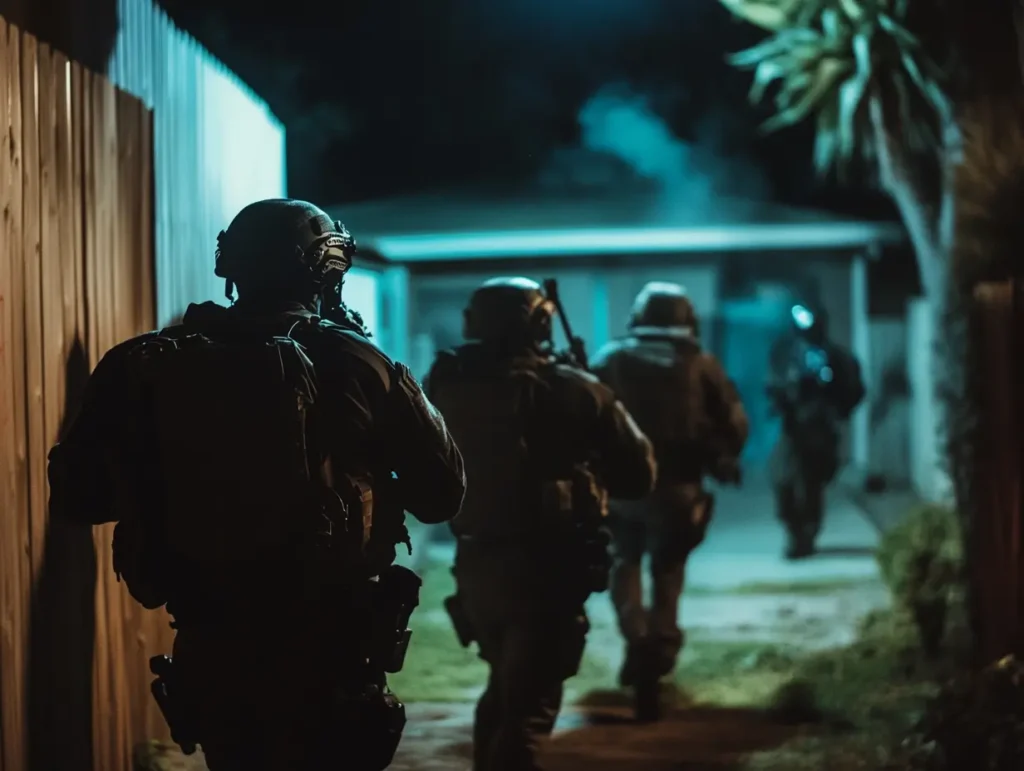
Daniel’s expertise kept him tethered to the investigation. Engineers asked his opinion on the soil’s stability, whether more collapses might follow. He answered as best he could, but his mind wasn’t on geology anymore. It was on Claire’s frightened eyes, on Ethan’s shaking hands, on Leo’s whispered question: “Are we safe?”
No answer felt strong enough. Not when he knew that one inmate had already surfaced. If one man had slipped through, others might have too. Daniel sat awake long after midnight, staring at the sinkhole glowing under floodlights. Each shadow in the yard felt like movement. Each sound, a threat.
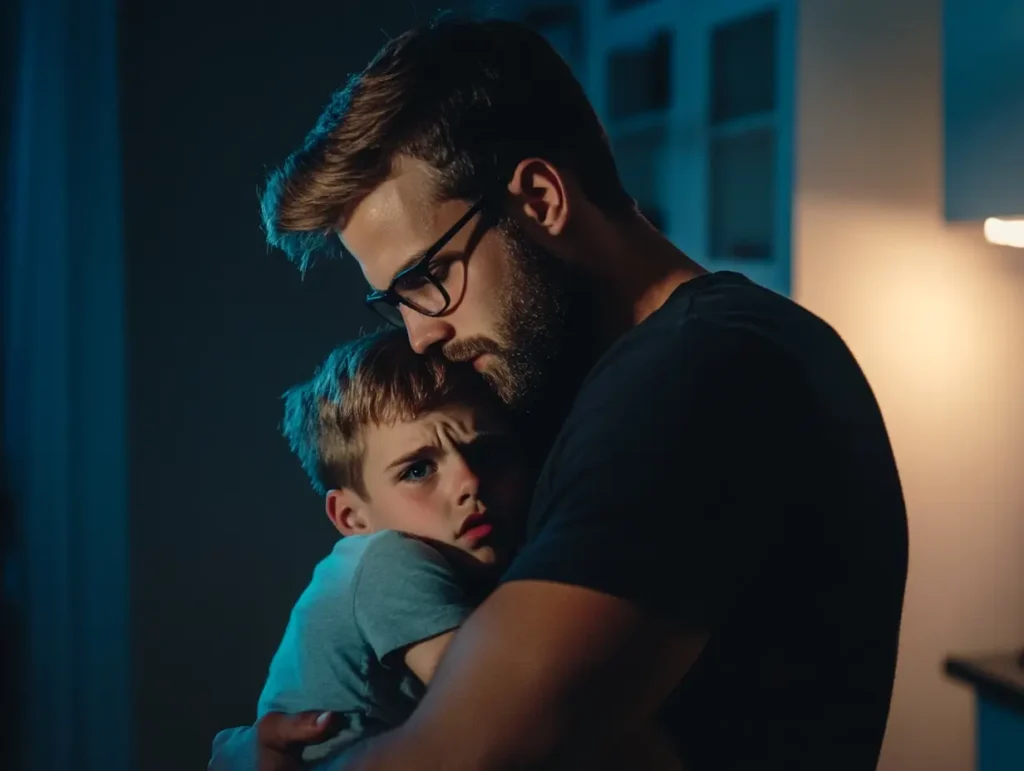
The interrogation of the captured inmate yielded more than anyone expected. Between curses and silence, he finally broke: there were two of them. One had been caught in the tunnel. The other had made it out. A single man, loose in the night. The revelation chilled Daniel more than the sinkhole itself.
Police assured him the fugitive couldn’t have gone far. A manhunt spread through the woods, searchlights sweeping across fields. Before leaving, the lead officer pressed a card into Daniel’s hand. “Lock your doors. Keep your family together. If anything happens, call this number. I’ll be back by morning.”
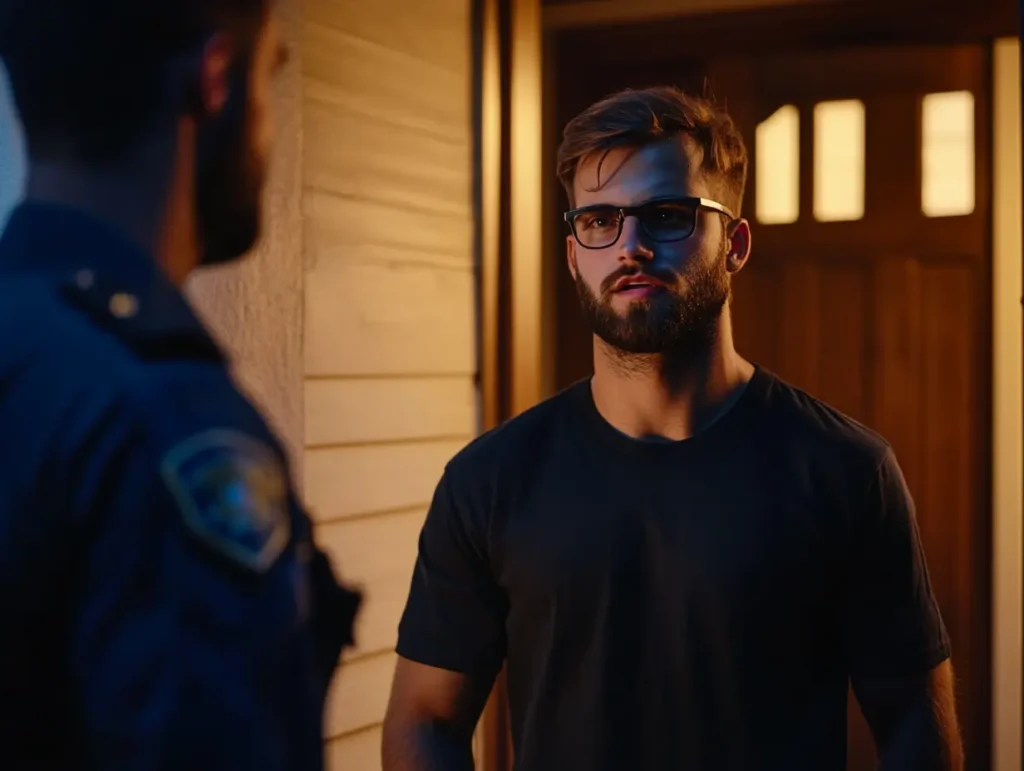
That night, Daniel pulled mattresses together in the bedroom. Claire tucked the boys in close, whispering promises of safety. Daniel sat in the armchair by the door, phone in hand, listening to every creak of the old house. Sleep came in restless fragments, broken by the weight of his dread.
Then, near midnight, he heard it—floorboards creaking downstairs. Slow, deliberate. His blood ran cold. He dialed the officer’s number, voice tight as he whispered, “Officer? I think… there’s someone in my house.”
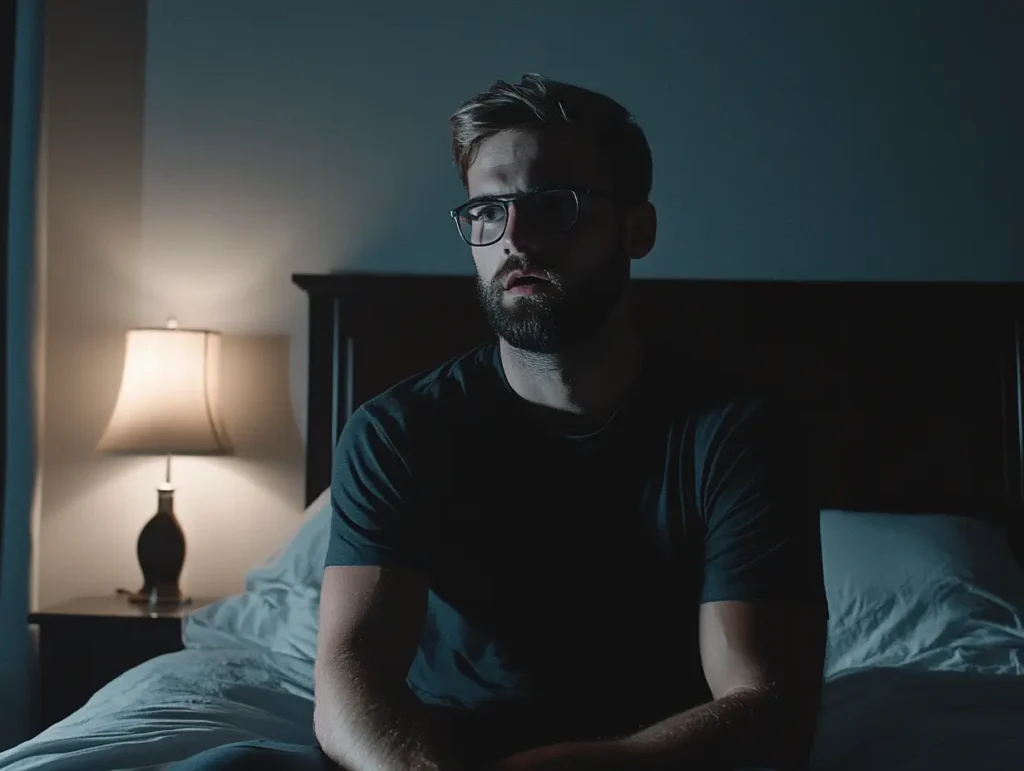
The reply came steady, trained for fear like this. “Alright, Daniel, listen to me carefully. I need you to lock your bedroom door, keep your family inside, and stay put. Don’t try to be a hero. I’m already on my way.” Daniel glanced back at Claire clutching the boys, their wide eyes locked on him. His throat felt tight. “He’s downstairs. I can hear him moving. What if he comes up?”
“You’ve done the right thing calling me,” the officer reassured. “Help is minutes away. Keep the line open. Your job is to protect your family by staying with them. Mine is to deal with whoever’s in your house.” Daniel nodded, though the officer couldn’t see it. “Just hurry.”
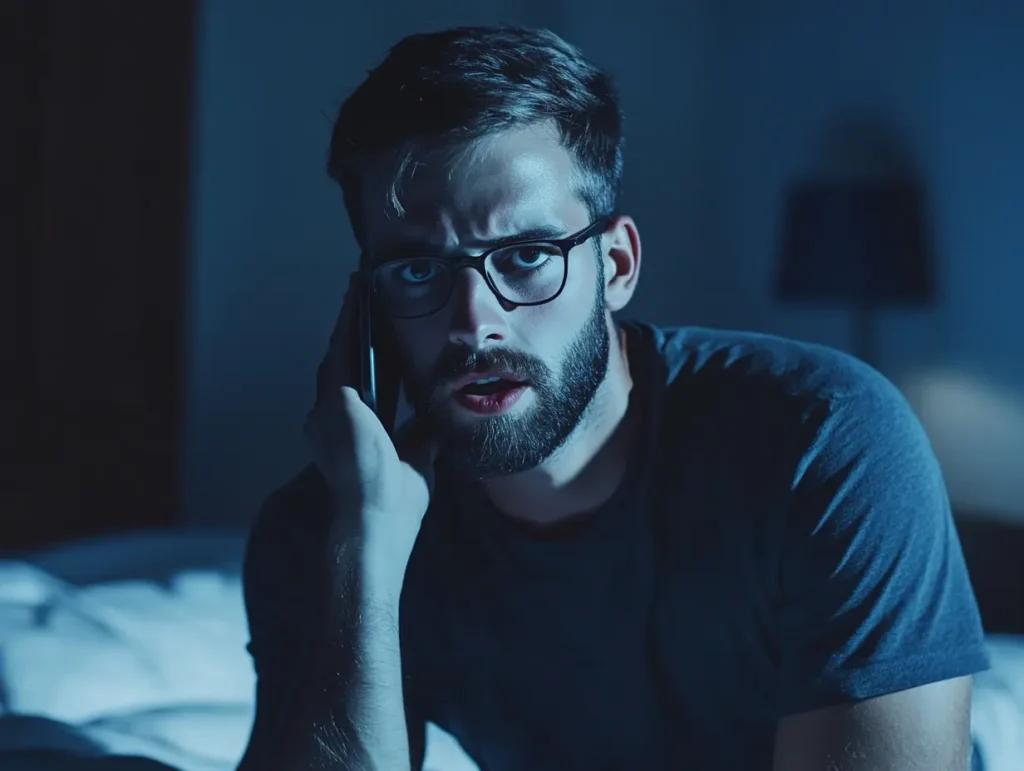
But as he hung up, instinct wrestled with reason. Every creak below sounded closer, every shadow at the crack of the door darker. His pulse roared in his ears. Despite the warning, his legs carried him toward the stairs—because he couldn’t stand waiting while danger prowled beneath his roof.
Daniel moved down the hall with the phone still warm in his hand, every step against the wood a test of his nerve. The officer’s words echoed in his head: Stay with your family. Don’t try to be a hero. But the thought of Claire and the boys trapped upstairs was unbearable.
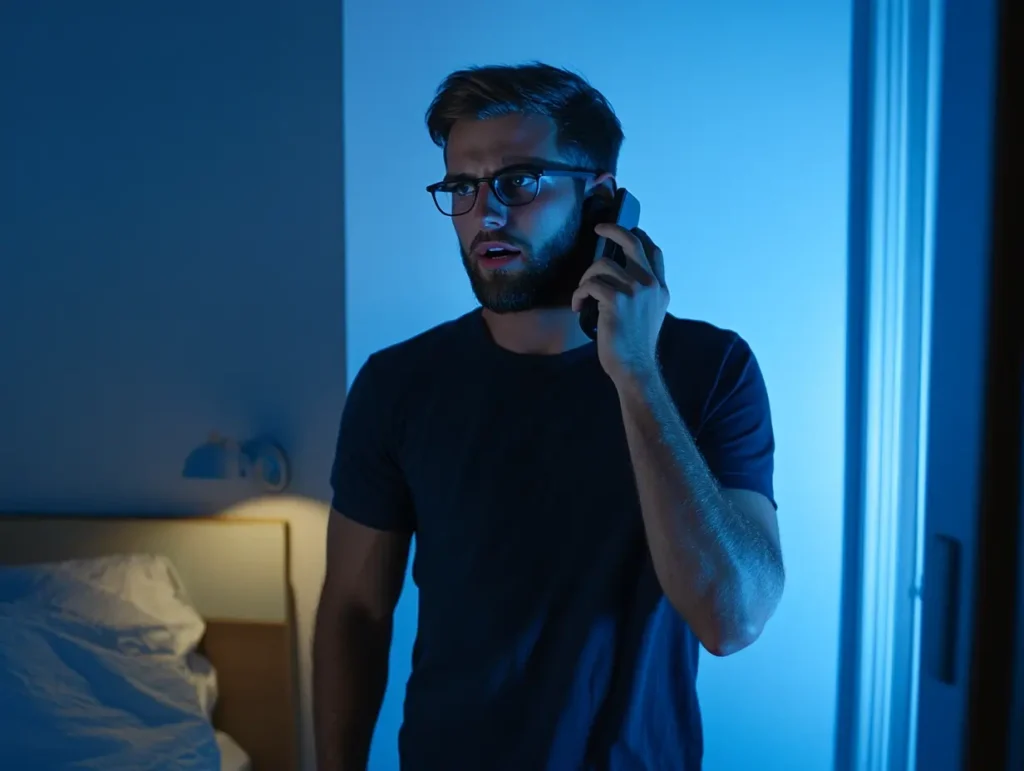
At the top of the stairs, he paused, heart hammering. Below, the faint glow of the porch light spilled across the living room. A figure crouched near the drawers, rifling through them with frantic, jerky movements. The missing inmate. His jacket was torn, his face hollow, but his eyes glinted with desperate focus.
Daniel eased backward, holding his breath, willing the floor not to betray him. But the old wood groaned under his weight. His foot slipped against the banister, the thud echoing like a gunshot in the still house. The fugitive’s head snapped up, eyes locking on him.
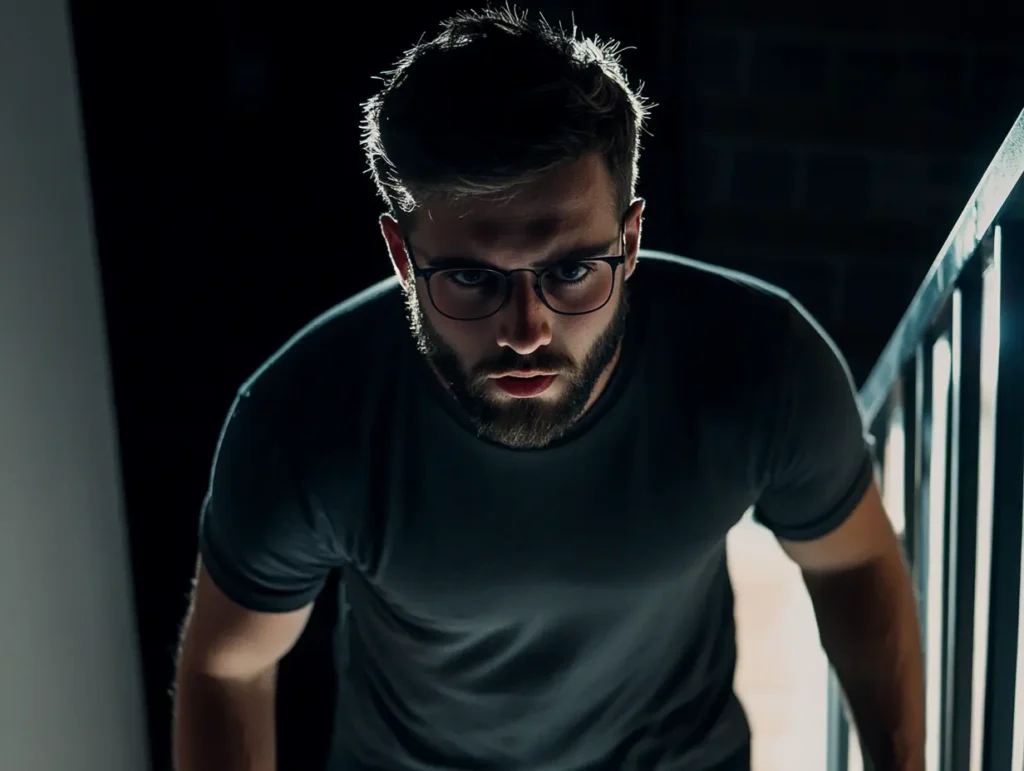
For a heartbeat, neither moved. Then the inmate bolted toward the door, shoving it open with a crash. Daniel stumbled after him, shouting into the phone, “He’s running! He’s running out!” Headlights cut across the yard.
A cruiser screeched to a stop, gravel spraying. The officer vaulted from the driver’s seat just as the fugitive hit the porch. They collided hard, the man slammed into the grass, cuffed in seconds. Daniel gripped the railing, chest heaving, as the officer dragged the prisoner upright.
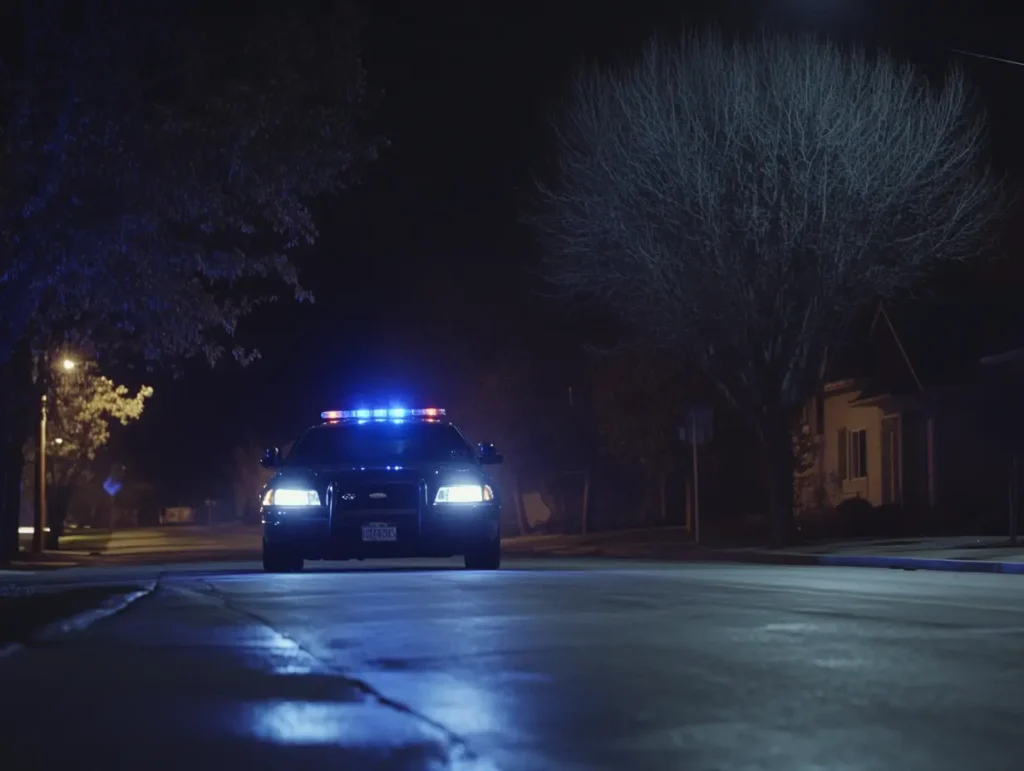
The inmate spat curses, thrashing uselessly in the officer’s grip. Blue lights strobed against the house, painting the windows in shifting color. Claire appeared at the top of the stairs, clutching the boys, her face stricken with relief. Daniel managed a shaky nod, whispering, “It’s over.” For the first time that night, he believed it.
Blue lights still washed across the yard as the fugitive was shoved into the cruiser. The officer turned on Daniel, fury in his voice. “I told you not to be a hero!” he snapped. “You’re lucky I was still circling the neighborhood. What if he’d slipped past me? What if he got away again?”
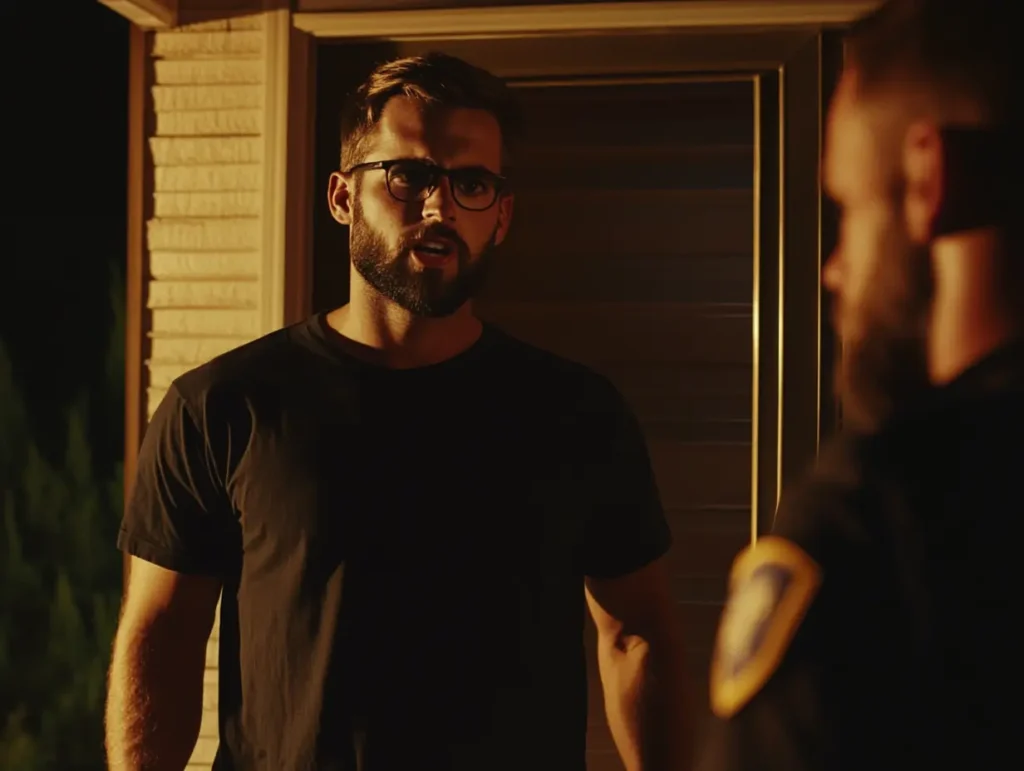
Daniel straightened, still shaking. “And what if he got upstairs? What if he reached my bedroom? I was the only line of defense between him and my family.” His voice cracked, but the steel in it was undeniable. For a moment, silence stretched between them.
The officer’s shoulders slumped. He exhaled, the edge of anger softening into something closer to respect. “Stubborn bastard,” he muttered, shaking his head. Then, unexpectedly, he let out a rough laugh. Daniel laughed too, the release of a night’s worth of fear spilling out. They clasped hands, firm and steady.
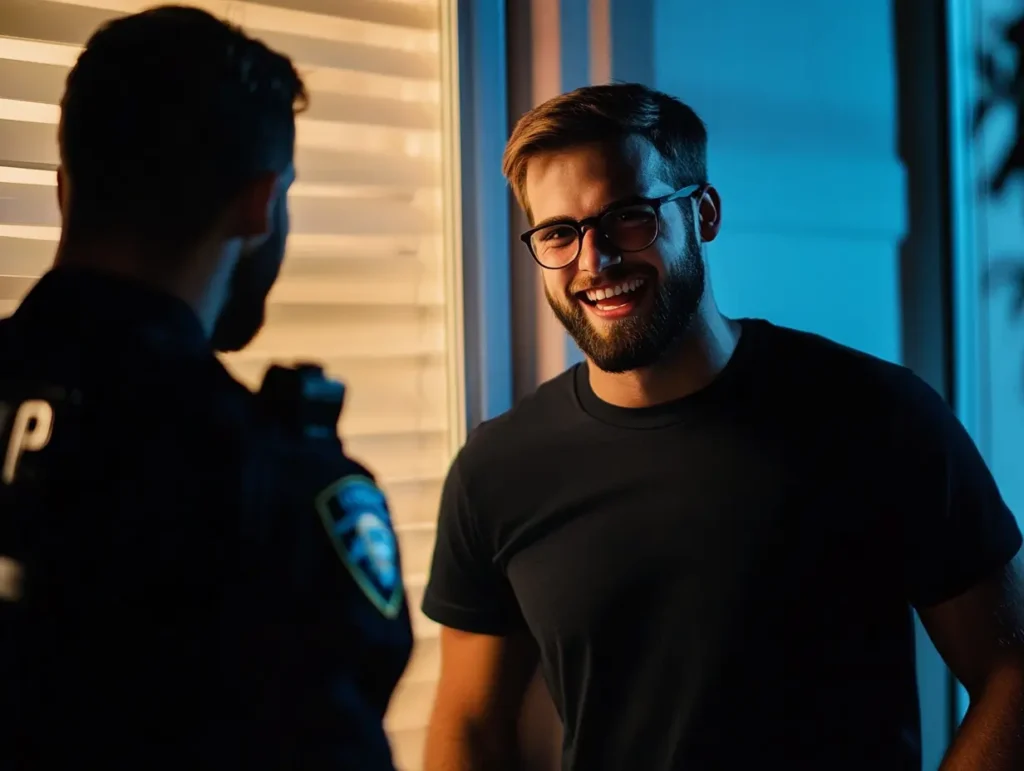
By morning, the sirens were gone. Reporters had packed up, the sinkhole sealed with barriers. Daniel sat on the porch with Claire, the boys tumbling across the grass, laughter returning to the yard. Their home bore scars, but it was theirs. And this time, the earth had given them back safety instead of taking it away.
